Computing & IS
Makerere Launches AI and Data Science Centre to Drive Africa’s Technological Development
Published
12 months agoon
By
Jane Anyango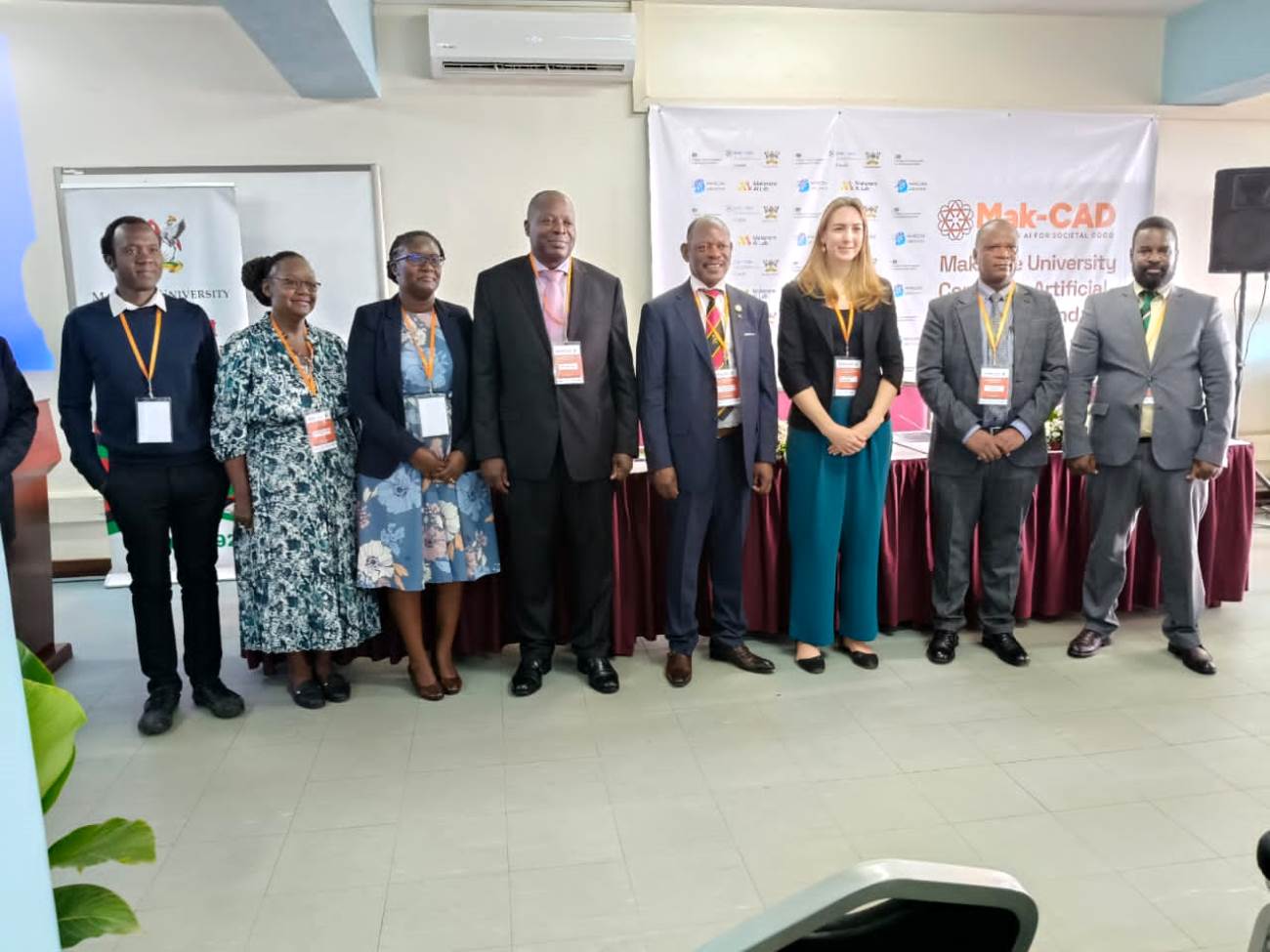
Kampala, March 13, 2025 – Makerere University has officially launched the Makerere University Centre for Artificial Intelligence and Data Science (Mak-CAD), a hub dedicated to advancing AI research and innovation for Africa’s development.
Themed “Building Responsible AI Research and Innovations for Impact,” the launch highlighted the Centre’s mission to harness AI’s transformative power to address critical issues, improve human development indices, and contribute to the UN Sustainable Development Goals (SDGs).
Mak-CAD is focused on leveraging AI for Africa’s development, with an emphasis on sectors like healthcare, agriculture, natural language processing, and climate action. The Centre is guided by Responsible AI principles, aiming to develop customized AI solutions, improve data quality, build local expertise, and integrate AI into policy. Its objectives include advancing AI research, training MSc and PhD students, and fostering collaborations with global AI labs.
Spearheaded by Dr. Joyce Nakatumba Nabende, the Centre is funded by the International Development Research Centre (IDRC) Canada and the UK’s Foreign, Commonwealth & Development Office. It collaborates with institutions such as Wellcome, APHRC, Google, and the National Institutes of Health (NIH) to drive AI innovation in Africa.
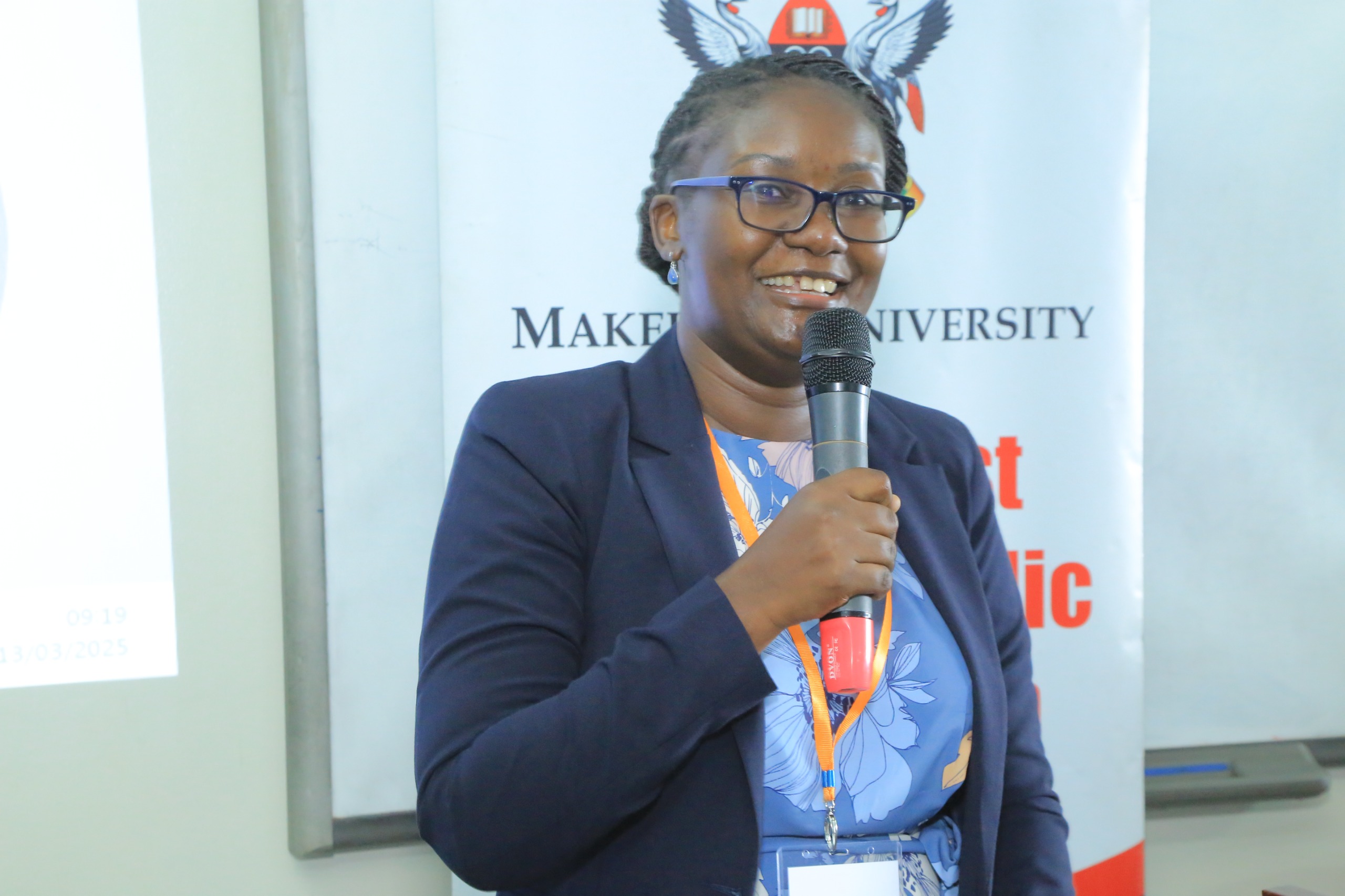
Mak-CAD will operate through two research labs: the Makerere Artificial Intelligence Lab in the Department of Computer Science, College of Computing and Information Sciences and the Marconi Machine Learning Lab in the Department of Electrical and Computer Engineering in the College of Engineering, Design and Art.
The launch event, held at Block B of the College of Computing and Information Sciences, featured significant activities including a keynote address on the need for AI4D multidisciplinary efforts by Dr. Agnes Kiragga of APHR, a panel discussion on AI4D research themes by a team of experts namely Tumuhamye Nathan (Programme Analyst and Head of Exploration, UNDP); D. Ernest Mwebaze (Sunbird ai), Dr. Edwin Mugume (College of Engineering, Design, Art and Technology, Makerere University). In addition to PhD students’ presentations and poster viewings of ongoing AI projects and innovations, 10 graduate students were awarded scholarships.
As Makerere positions itself as a leader in AI research in Africa, stakeholders expressed optimism about the Centre’s potential to transform key sectors and contribute to national and continental development.
UK Commits to Supporting Uganda’s AI Ecosystem
Presiding over the launch as chief guest, HE Tiffany Kirlew, Deputy British High Commissioner to Uganda, commended the initiative, emphasizing AI’s role in addressing critical challenges.
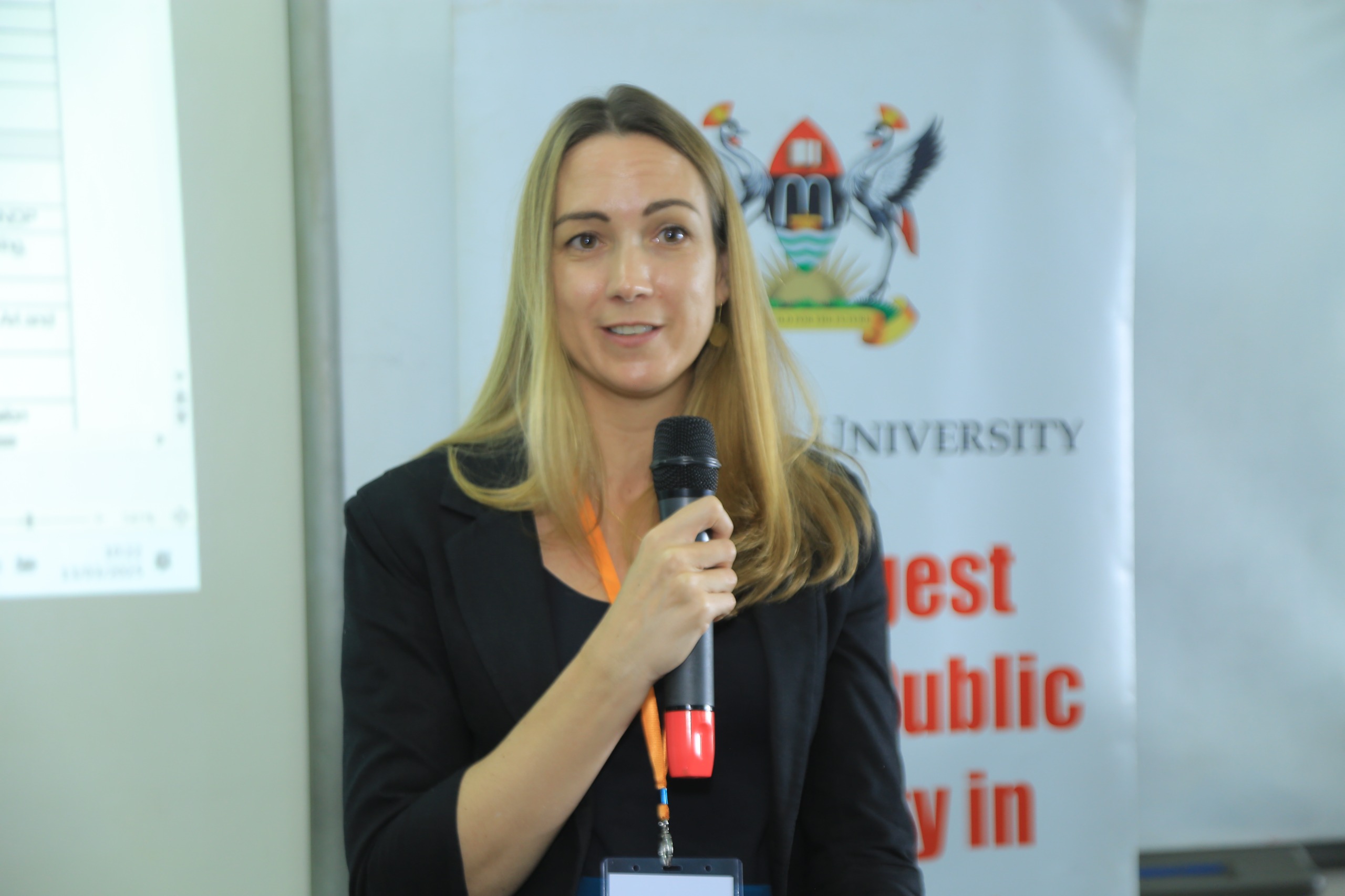
“This lab is not just about research; it’s about solutions—solutions that matter to people in health, the environment, food security, and economic growth,” she said. “AI-powered diagnostics developed here could mean faster, more accurate, and more accessible testing for diseases like malaria and tuberculosis, especially in rural areas where doctors are scarce.”
Kirlew highlighted Uganda’s opportunity to build AI solutions tailored to local needs. “Unlike some developed nations that have had to adapt to AI, Uganda has a chance to leapfrog development by creating homegrown AI solutions,” she said.
The UK, she noted, is committed to supporting Uganda’s AI ecosystem through research partnerships, digital skills training, and scholarships. Kirlew emphasized the country’s unique position to develop AI solutions powered by local talent and driven by local challenges. She expressed excitement about the UK’s role in Uganda’s AI and tech journey, mentioning the AI for Development @AI4Dev program, which invests in Africa-focused AI research.
She also highlighted the UK’s digital access program in Eastern Uganda, empowering over 100 entrepreneurs with future-ready digital skills. Reflecting on Uganda’s transformation, she expressed confidence that with the exceptional talent present, Uganda will not only keep pace with the AI revolution but also assume a leadership role.
Kirlew concluded by resonating with Makerere University’s motto, “We build for the future,” expressing eagerness to see the Mak-CAD grow and make a profound impact on Uganda’s future.
Africa Must Embrace AI to Avoid Being Left Behind – Prof. Barnabas Nawangwe
Makerere University Vice-Chancellor, Prof. Barnabas Nawangwe, emphasized the urgent need for Africa to embrace artificial intelligence (AI) to avoid being left behind in the global technological revolution.
“As far as artificial intelligence is concerned; will Africa be left behind again?” he posed. “This is the defining question for us, and Makerere University is determined to ensure that we are part of this technological revolution.”
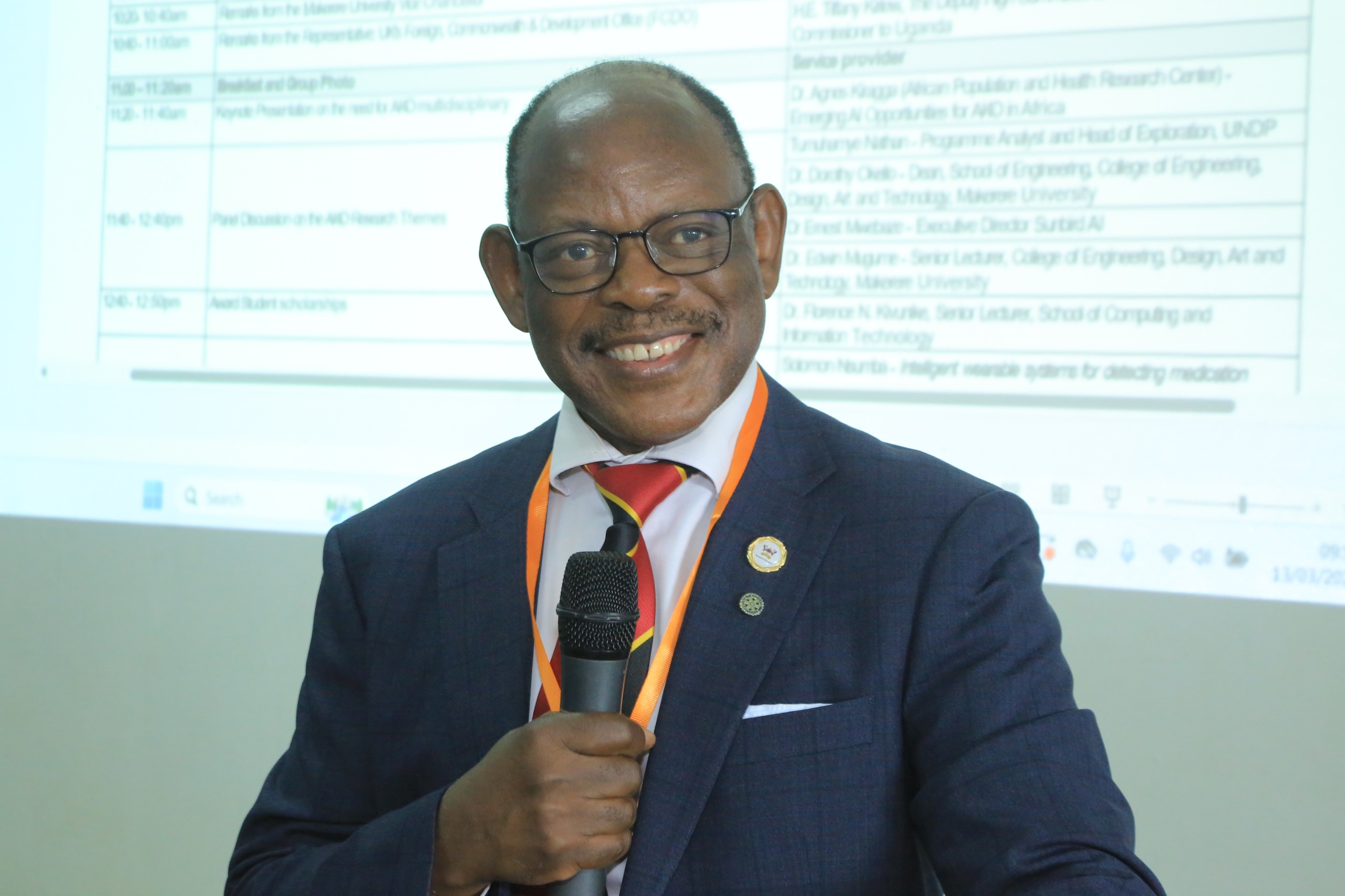
Prof. Nawangwe highlighted AI’s pivotal role in research, education, and innovation. He stressed the importance of training more PhD graduates who can drive AI advancements across the continent.
“Artificial intelligence is the future of the world. Those who want a good life must harness it,” he stated, echoing the urgency for Africa to integrate AI into its development strategies.
Reflecting on Africa’s educational challenges, Prof. Nawangwe pointed to the need for 1 million PhDs in the next 10 years to lift the continent out of poverty. “We must train like China does. We must contribute to the number of PhDs that the World Bank is talking about,” he urged.
While celebrating Makerere’s global achievements, he also acknowledged the challenge that remains. “Our students have competed worldwide and beaten the best. But why do we keep quiet about our successes?” he asked.
He concluded by urging Makerere to continue leading Africa’s AI revolution, emphasizing that the university must not only contribute globally but also drive transformative change within the continent. “What are we bringing back home?” he questioned, underscoring the importance of making AI a tool for Africa’s development.
CoCIS Principal Hails UK Envoy, Highlights AI Lab’s Achievements
The Principal of Makerere University’s College of Computing and Information Sciences (CoCIS), Prof. Tonny Oyana, welcomed the UK High Commissioner to Uganda, expressing gratitude for the diplomat’s visit and highlighting the college’s strides in artificial intelligence, data science, and sensor technology.
Prof. Oyana underscored the institution’s commitment to becoming a global leader in technology-driven research. “Our niche in the college is computer science, data science, artificial intelligence, and sensor technology,” he said. “We position ourselves not just as African leaders but as global leaders in this field.”
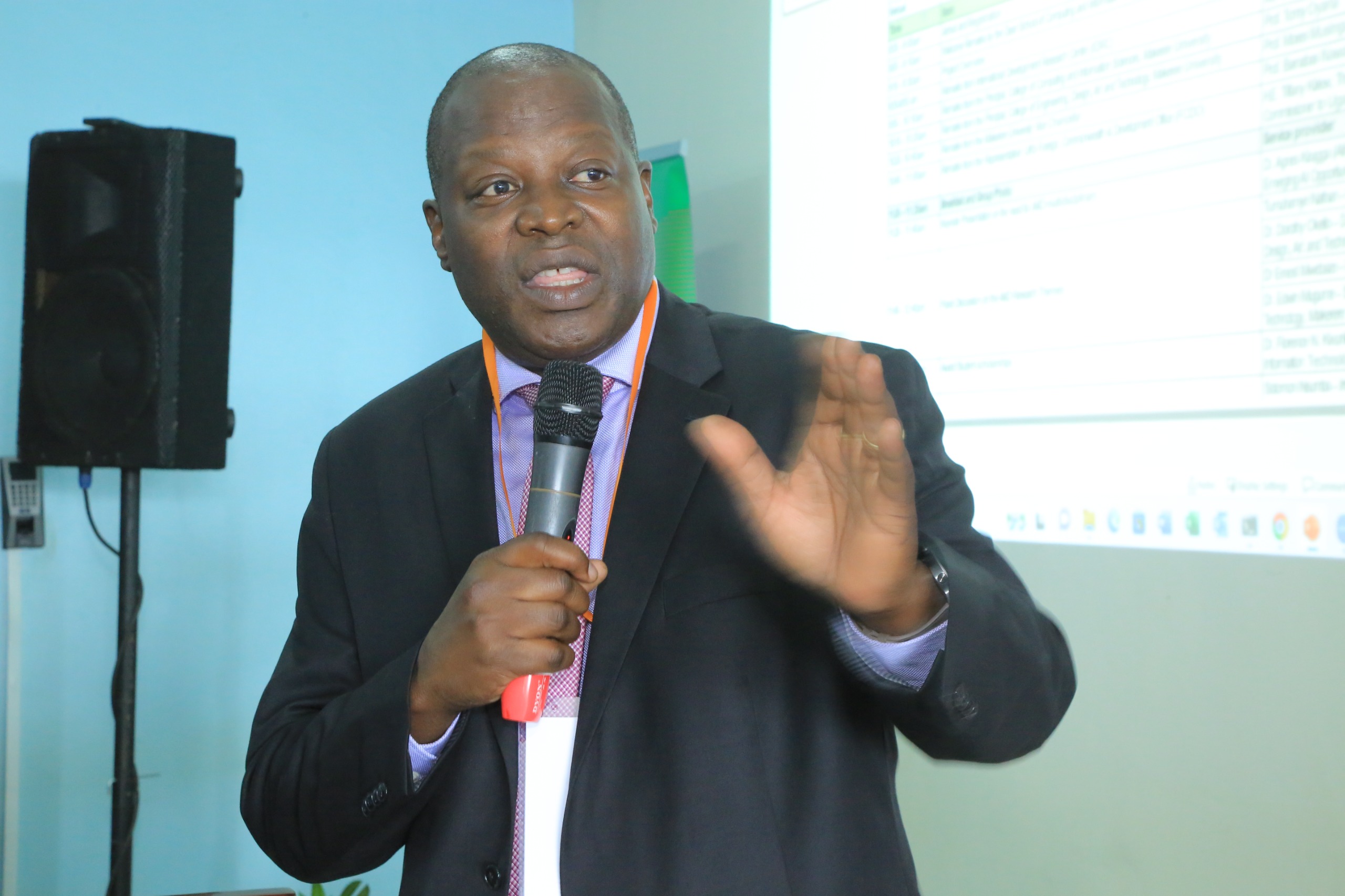
Prof. Oyana also lauded the recent collaborative efforts with South Korea, noting that the partnership would enhance the college’s infrastructure. “One of the initiatives includes shared workspaces in the new research building and repair of lifts, which will be constructed in collaboration with the College of Engineering,” he revealed.
He acknowledged the contribution of Dr. Joyce, a key figure in the Artificial Intelligence (AI) Lab, crediting her leadership for sustaining the lab’s growth. “We were worried about the lab collapsing, but she has mobilized resources and enabled scientific advancements,” he stated.
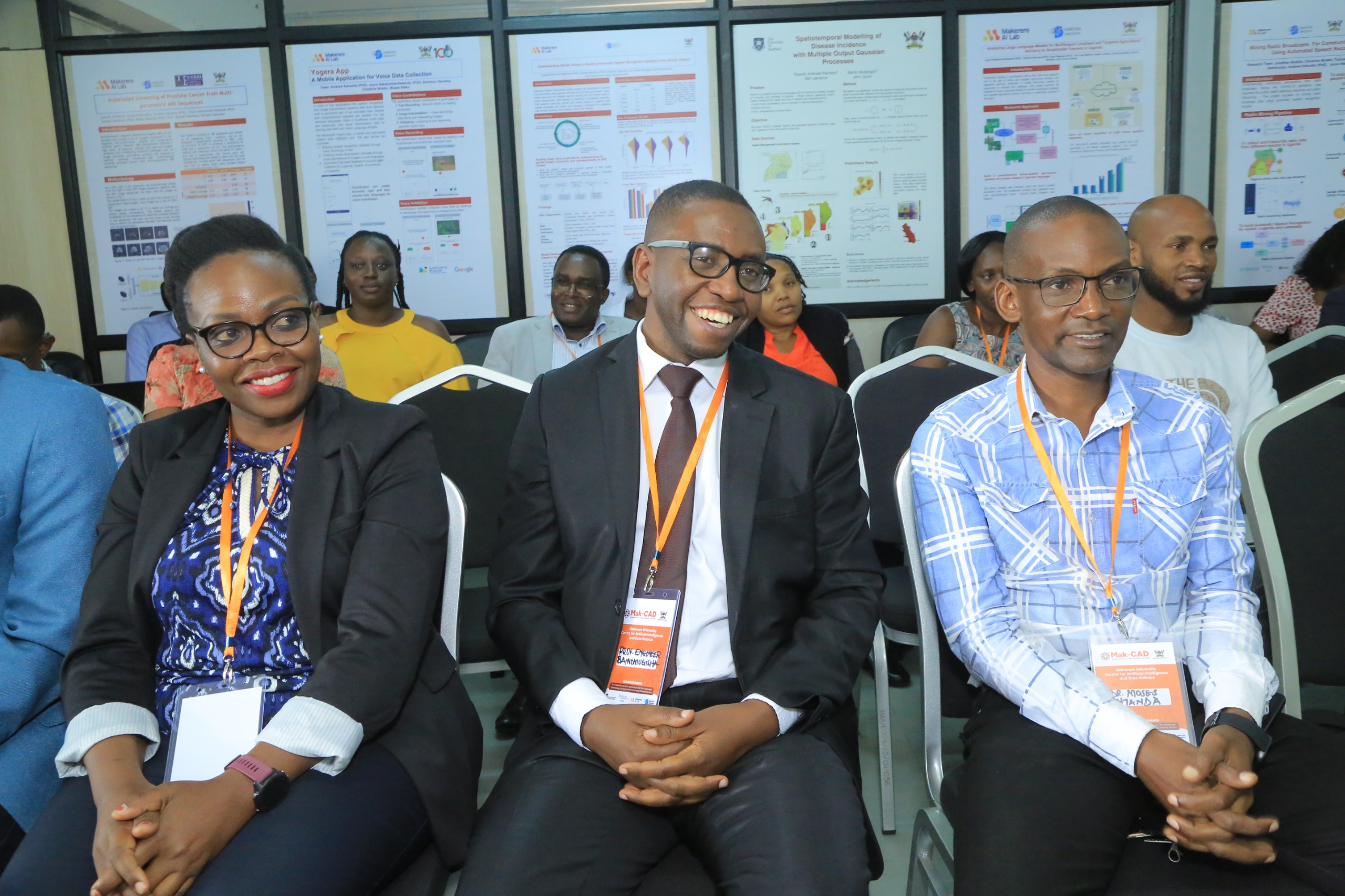
Additionally, Prof. Oyana commended Dr. Ernest Mwebase for his pioneering efforts in AI, recognizing his role in training the next generation of scientists. “Dr. Mwebase played a critical role in the development of AI at Makerere, and his leadership at Sunbird AI, Uganda’s first locally owned AI company, is commendable,” he said.
He also highlighted the college’s recent academic achievements, revealing that CoCIS graduated 681 students, including 12 PhD holders—the highest number in the college’s history. “Seven of these PhD graduates were female, a strong testament to our efforts in gender parity,” he added.
Prof. Oyana concluded by reaffirming the college’s dedication to advancing AI research and equipping students with skills for the 21st century. “We promise to be leaders in preparing youthful talent and driving research productivity in AI and sensor technology,” he affirmed.
Just as parents, we must nurture a newborn to realize its full potential- Dr. Balikuddembe
Dean of the School of Computing and Informatics Technology, Dr. Joseph Kibombo Balikuddembe, likened the Centre to a growing plant or a newborn that requires nurturing, strategic input, and constant development to flourish. As a university, the goal is to remain at the forefront of innovation, equipping students and industry players with cutting-edge research and solutions that address real-world challenges—from health and agriculture to language models and policy formulation.
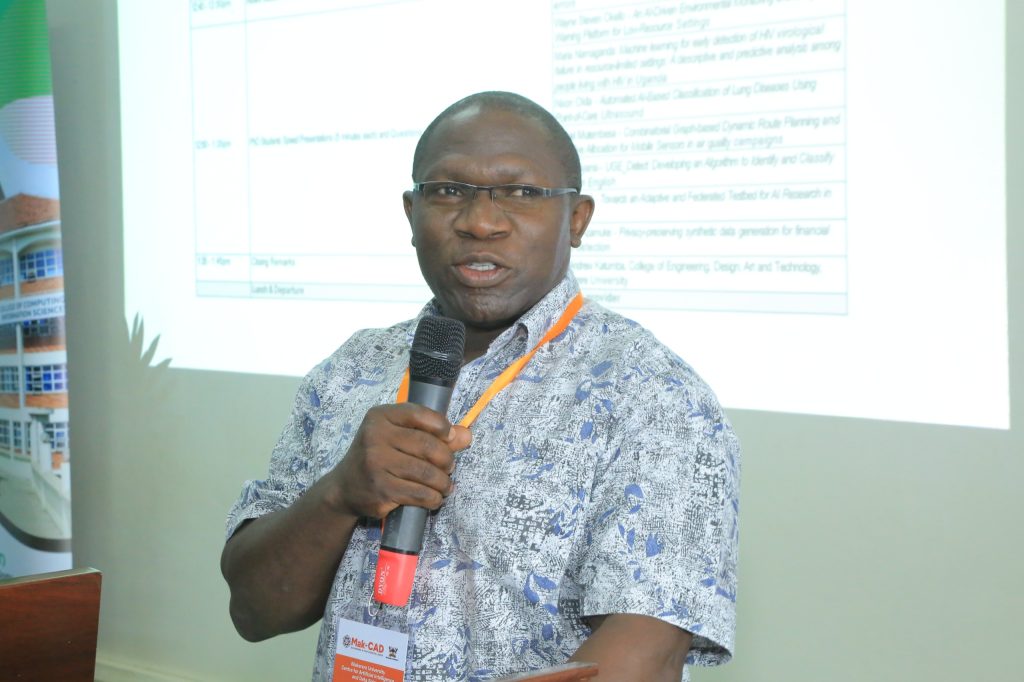
“Today, we celebrate the launch of a new initiative at the School of Computing and Information Technology. Just as parents nurture a newborn, we must cultivate and grow this new endeavor to reach its full potential”, Dr Joseph Balikudembe
Principal of CEDAT Pledges Commitment to AI Research and Collaboration for Smart Solutions at Makerere University
The Principal of the College of Engineering, Design, Art, and Technology (CEDAT) at Makerere University Prof. Moses Musinguzi emphasized the importance of collaboration in maximizing synergies between the college’s departments and the growing field of Artificial Intelligence (AI). Prof. Musinguzi highlighted the evolving role of technology in both teaching and operations, noting how AI is transforming industries and how it aligns with CEDAT’s mission.
“At CEDAT, we design machines, and with the shift from analogue to digital systems, computing has become central to the design and operation of these machines,” the Principal explained, underlining the deep connection between engineering and computing in modern technology.
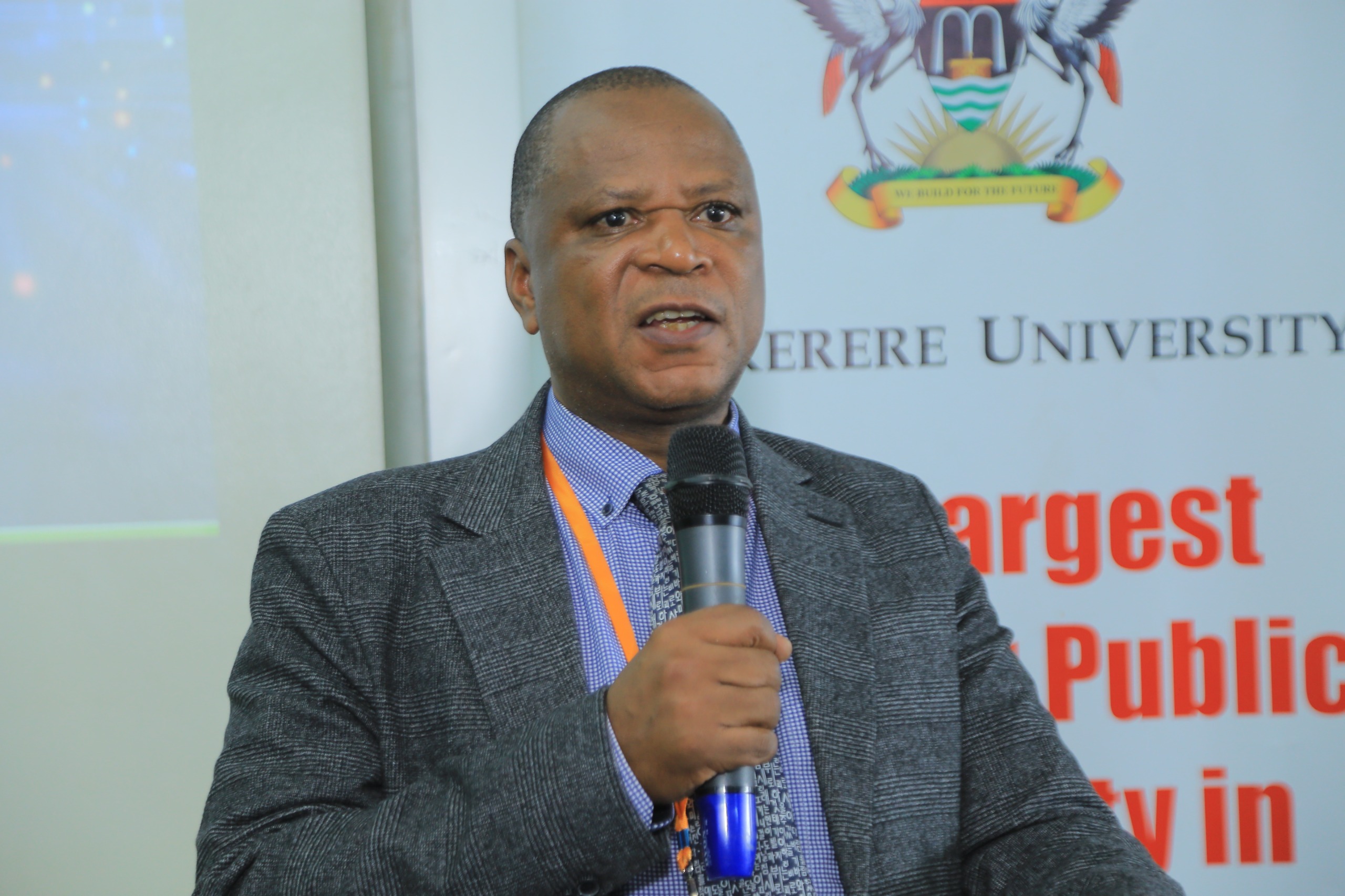
Prof. Musinguzi acknowledged that many in the academic community are still familiarizing themselves with AI. However, he expressed confidence that initiatives like the one being discussed would significantly enhance the university’s capacity to understand and apply AI in various fields, including research, teaching, and institutional operations.
Reflecting on his recent trip to South Korea, Prof. Musinguzi shared how AI and robotics are integrated into everyday life, even in the hospitality industry. “In the restaurant we visited, a robot served us. This is AI in action,” he said, noting the profound impact of AI in bridging the technological divide between the global north and south.
He also raised an important question about the role of African universities in this technological shift. “Before we talk about automating Uganda or creating smart cities, why not start here at Makerere University? Let’s lead by example by developing prototypes and testing them on our campus first,” he proposed, emphasizing the role of local solutions in fostering wider societal changes.
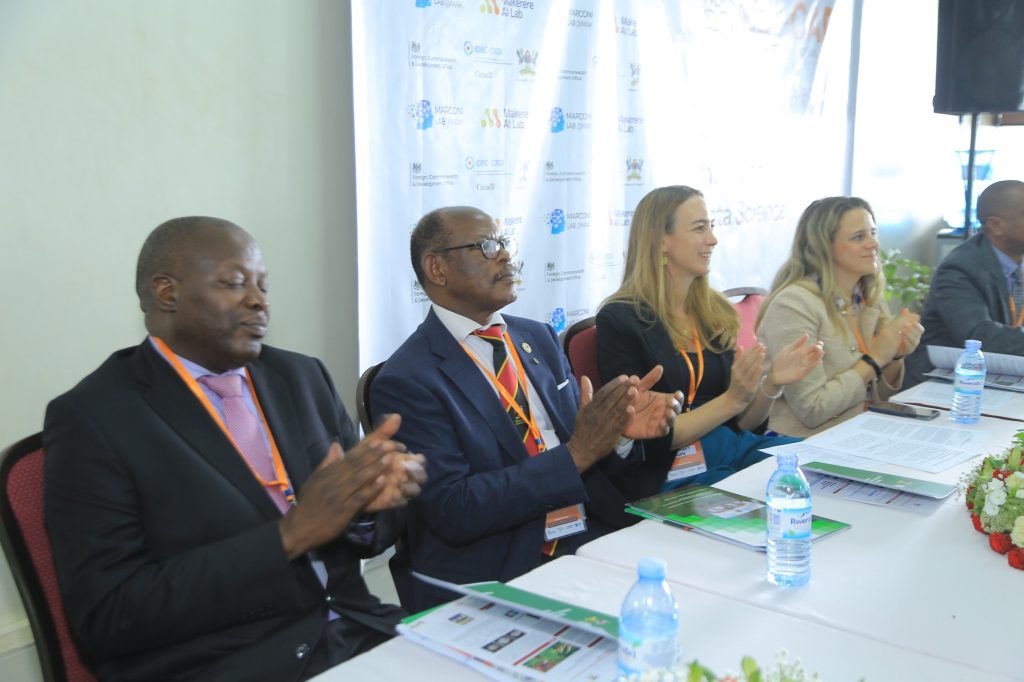
In closing, the Prof. Musinguzi reaffirmed CEDAT’s commitment to AI research and collaboration with other colleges within Makerere University. “We look forward to not just producing research papers, but also tangible, real-world outputs that will benefit communities and showcase the innovative contributions of our university,” he said.
Makerere AI Lab Leads Groundbreaking Research in Artificial Intelligence – Project Leader Dr. Joyce Nakatumba
Makerere University’s Artificial Intelligence (AI) Lab continues to lead the way in AI research on the African continent, tackling some of the most pressing challenges in health, agriculture, climate, and language technology. Established in 2011, long before AI became a global phenomenon, the lab has played a pioneering role in applying AI to real-world problems.
Speaking at the event, Dr. Joyce Nakatumba Nabende, the Principal Investigator and a senior lecturer in the Department of Computer Science, reflected on the lab’s journey and its impact over the years. “We started this journey under the leadership of Dr. John Quinn and Dr. Ernest, at a time when AI had not yet gained mainstream attention,” she said. “This was before ChatGPT became a household name, and before artificial intelligence became widely recognized. Our focus was on leveraging AI to solve real-world problems, even before the hype.”

Dr. Nakatumba commended Makerere University for creating an environment that fosters research and innovation. “I appreciate the university for enabling us to do this research. The Vice Chancellor, Prof. Barnabas Nawangwe, has provided immense support in grant management and administration, ensuring that our work continues to thrive,” she said.
Over the years, the AI Lab has grown in scope and impact. Initially focused on malaria microscopy, a project that has since evolved into the Makerere AI Health Lab under Dr. Rose Nakasi, the lab has expanded its research into multiple fields. “We started with malaria microscopy under Ocular, and now our research spans several domains, including agriculture, climate change, and language technology,” Dr. Nakatumba noted.
A significant achievement of the lab has been its role in training and mentoring young AI researchers. “One of our proudest accomplishments is seeing our students grow. We have trained both MSc and PhD students, many of whom started as interns and are now leading researchers in their own right,” she said. “It is fulfilling to watch them take on bigger roles, apply their knowledge, and contribute to the advancement of AI.”
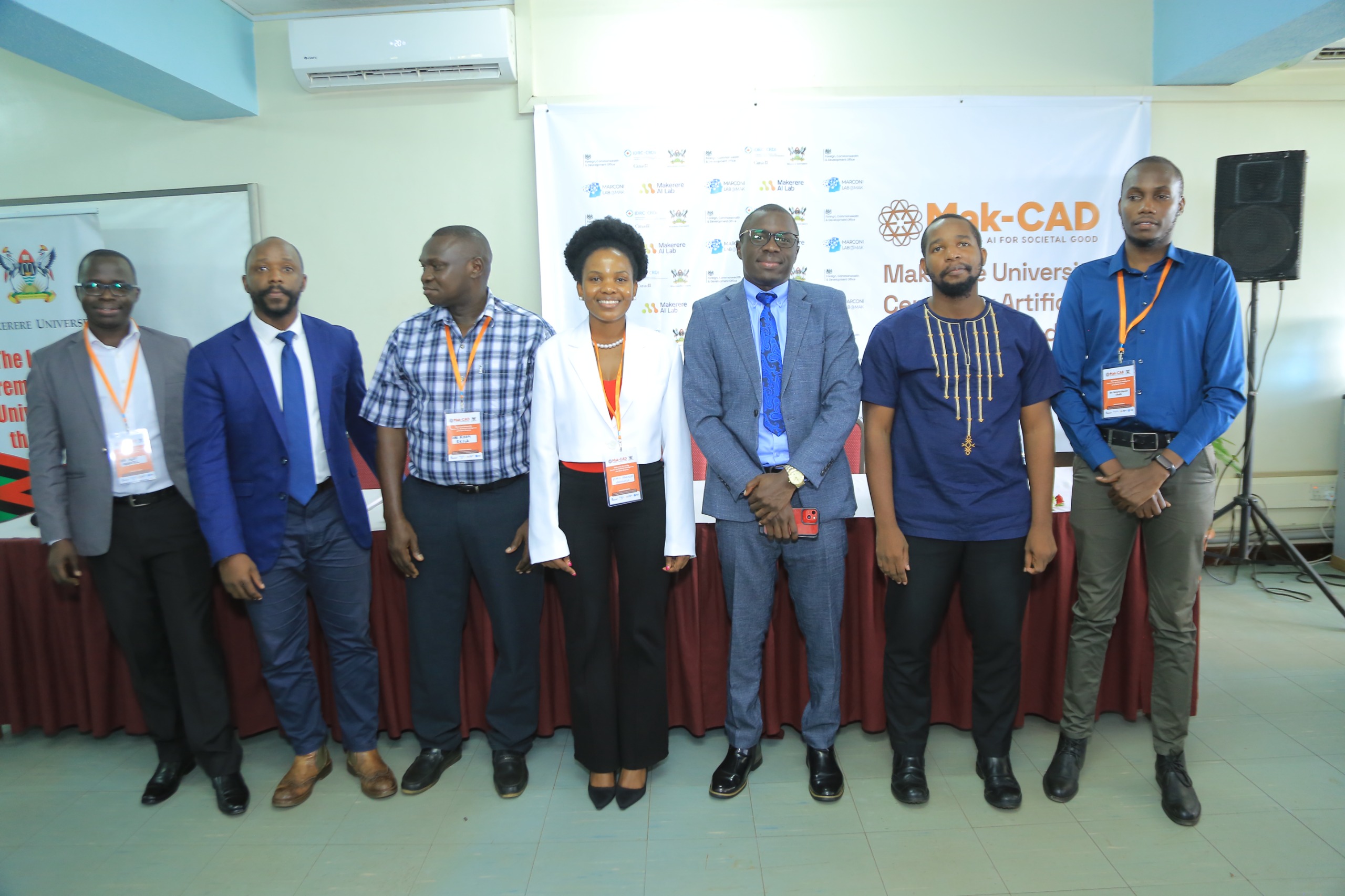
However, AI research in Africa has faced its own set of challenges, one of the biggest being access to data. “Machine learning thrives on data. When we started, we realized that there were no datasets for African languages, health applications, or many other sectors,” Dr. Nakatumba explained. “We have since worked tirelessly to build datasets in health, agriculture, climate science, and language processing. These datasets are now publicly available, not only for our research but also for AI development globally.”
Dr. Nakatumba emphasized that the lab operates under three key pillars: advancing AI science, training students, and ensuring that research translates into practical impact. “People often ask, ‘You’ve done all this research, but is it being used?’ That is our guiding principle—making sure that our AI innovations are not just theoretical but are solving real challenges in society,” she said.
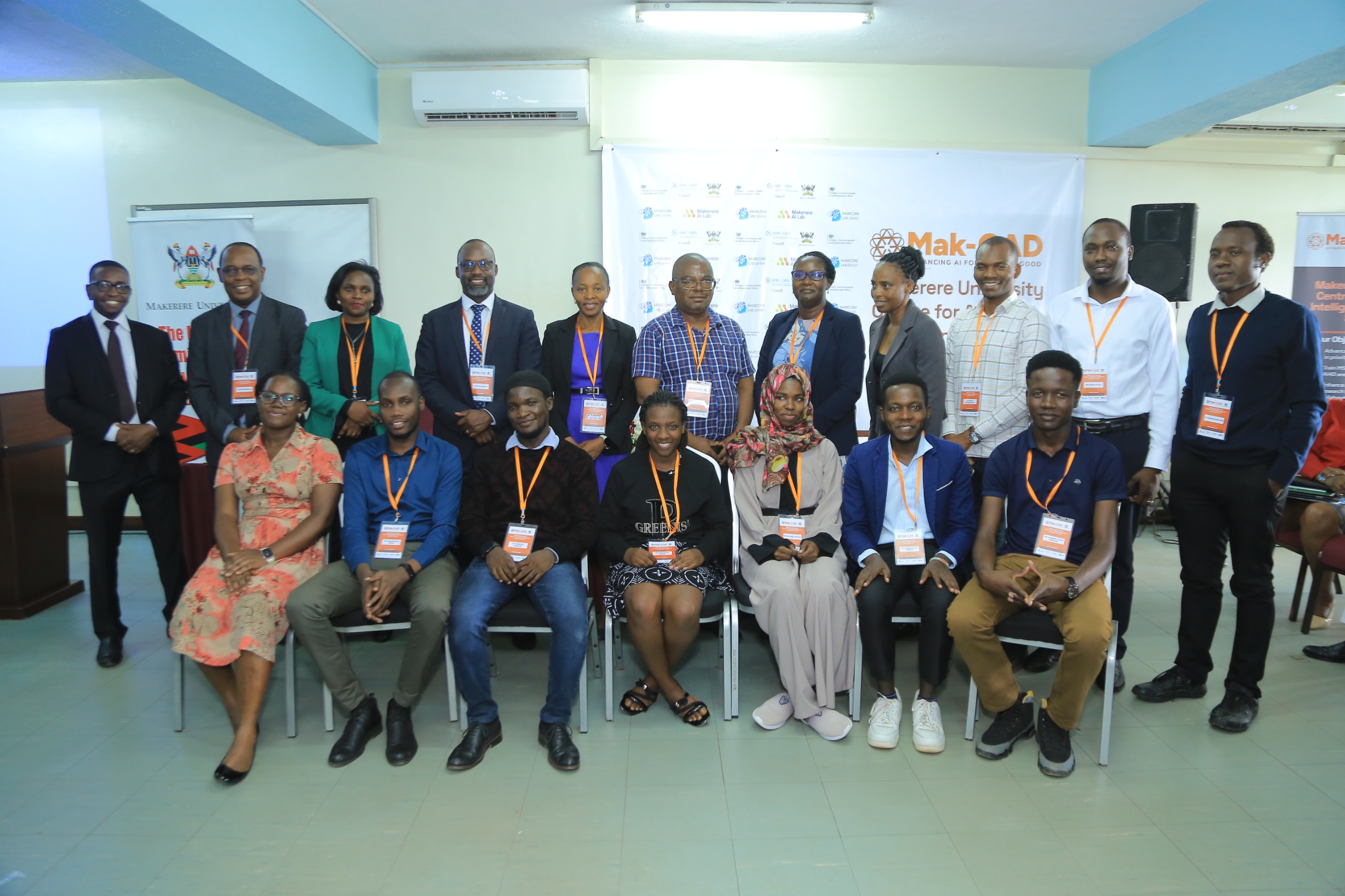
Through partnerships with institutions such as the National Agricultural Research Organization (NARO), the Uganda Cancer Institute, and the Institute of African Languages, the lab has developed AI-powered solutions tailored to local needs. “From using AI to monitor air quality in Uganda’s urban centers to deploying AI-driven diagnostic tools in healthcare, we align our research with the pressing issues facing our communities,” she noted.
She also highlighted the importance of interdisciplinary collaboration, which has been central to the lab’s success. “Our work goes beyond computing. We collaborate with health scientists, engineers, linguists, and environmentalists. This multidisciplinary approach has helped us secure international grants such as those from the NIH for data science programs,” she said.
Dr. Nakatumba reaffirmed the lab’s commitment to advancing AI research and training more students in the field. “We are moving towards establishing a Center for AI and Data Science at Makerere University. With support from institutions like IDRC and FCDO, we aim to push the boundaries of AI innovation, train more students, and ensure that our work has a lasting impact,” she said.
Keynote Speaker Dr. Agnes Kiragga Calls for Accelerated AI Integration to Transform Public Health and Education in Africa
In her keynote address, Dr. Agnes Kiragga, an expert in health systems and data science, shared a compelling vision for the role of Artificial Intelligence (AI) in transforming Africa’s public health and educational systems. She emphasized the potential of AI to reshape the continent’s future, particularly in addressing the deep health challenges and educational needs that many African nations face.
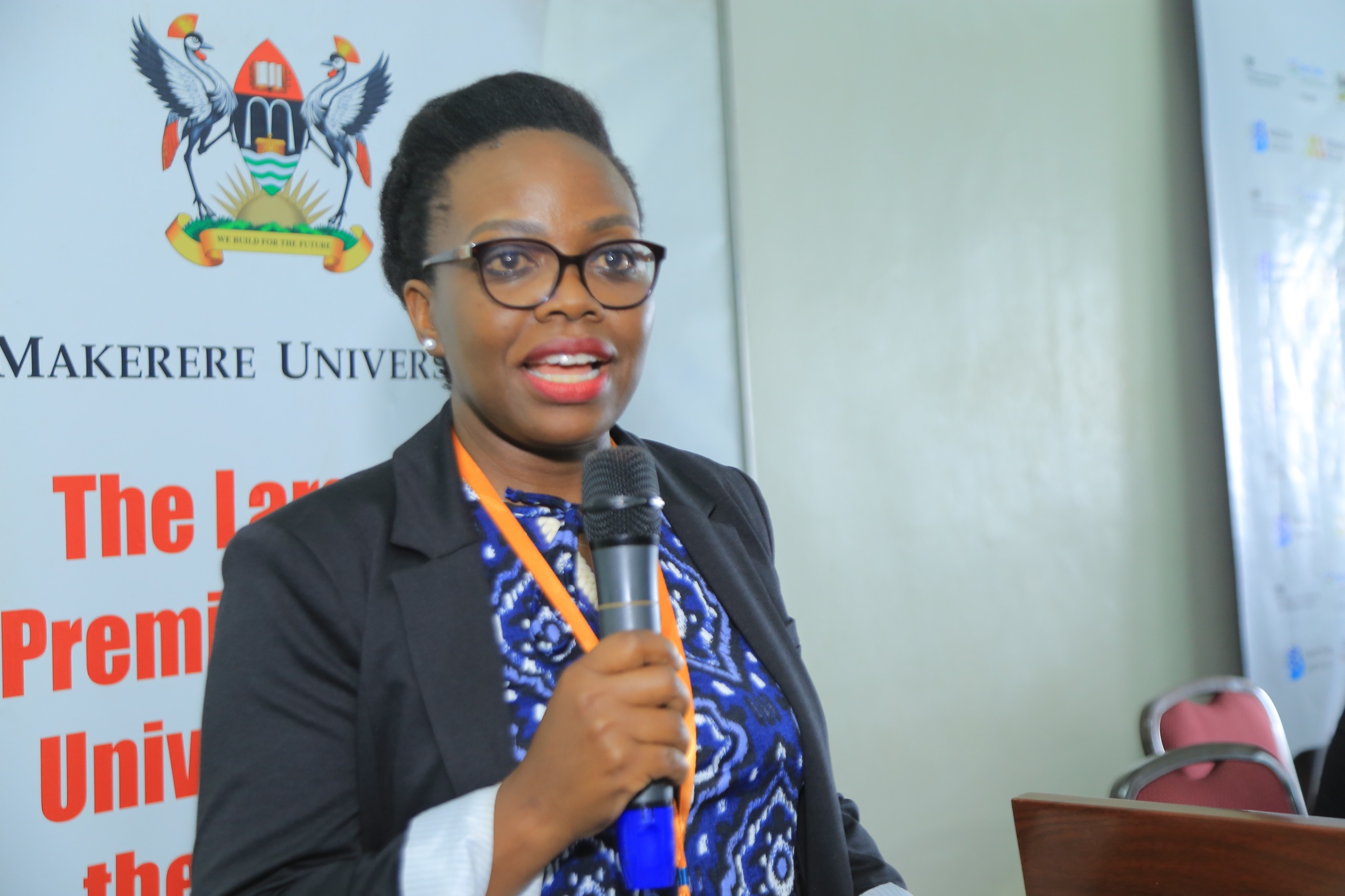
Dr. Kiragga, a senior researcher at the African Population and Health Research Centre (APHRC) in Nairobi, Kenya, highlighted the importance of AI in revolutionizing healthcare delivery, from infectious disease management to chronic disease prevention. “The digitalization of health systems, driven by AI, is not just a luxury but a necessity if we are to improve access and outcomes, especially in remote areas,” she noted.
She also underscored the significance of AI in the education sector, referencing the continent’s growing youth population. “With Africa’s workforce expected to expand dramatically by 2030, AI-powered educational tools can play a pivotal role in scaling up skills development, particularly in digital literacy,” she stated. She also pointed out that innovations like mobile-based education platforms and AI applications for healthcare could drive progress in regions with limited infrastructure.
While excited about Africa’s AI potential, Dr. Kiragga stressed the urgency of overcoming barriers to digital inclusion, including limited internet access and mobile penetration. “To achieve the transformative potential of AI, we must ensure that innovations reach the last mile, from rural villages to urban centers,” she said.
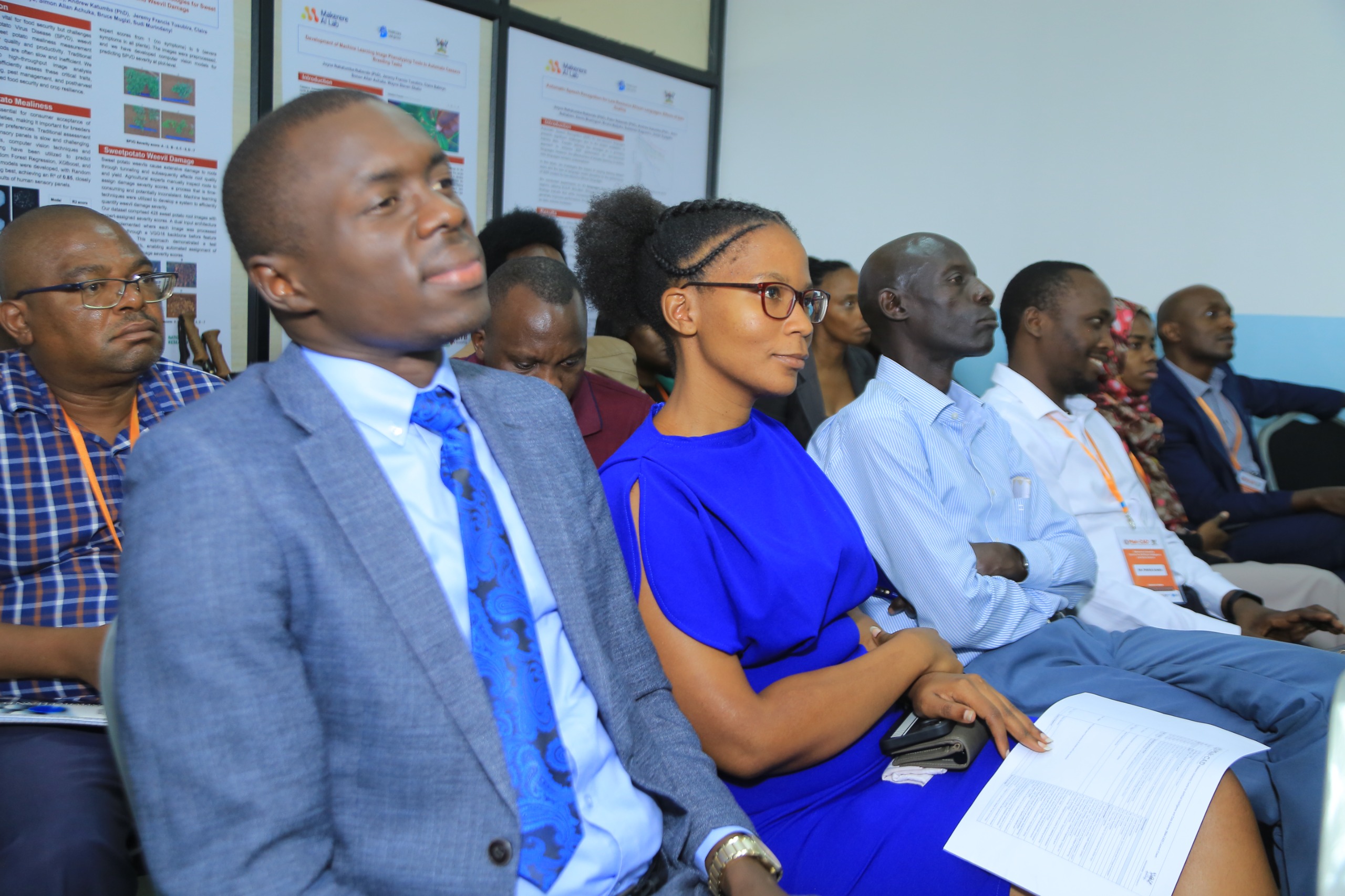
Kiragga called for stronger collaboration across sectors and nations to create policies that foster AI innovation while addressing data governance and ethical concerns. “AI is data-hungry and needs robust governance frameworks to ensure that it serves the public good,” she emphasized.
As Africa stands on the brink of an AI-driven future, Dr. Kiragga’s message was clear: innovation and strategic partnerships are key to unlocking AI’s full potential for the continent’s development.
UNDP Calls for AI Policy and Practical Applications to Address Uganda’s Development Challenges
The United Nations Development Programme (UNDP) called for urgent action to elevate discussions on Artificial Intelligence (AI) in Uganda, emphasizing the need for a national AI policy and practical AI applications to address key development challenges in agriculture, healthcare, and mobility.
Tumuhamye Nathan, UNDP Program Analyst and Head of Exploration, stressed that AI must be contextualized to fit Uganda’s unique challenges rather than being perceived as an abstract or foreign concept. “We need to elevate the discussion of AI to look at our context in which we operate. If you look at agriculture, how do we use AI to advance technology within this sector? If you look at mobility, what role can AI play in improving transportation?” he stated.
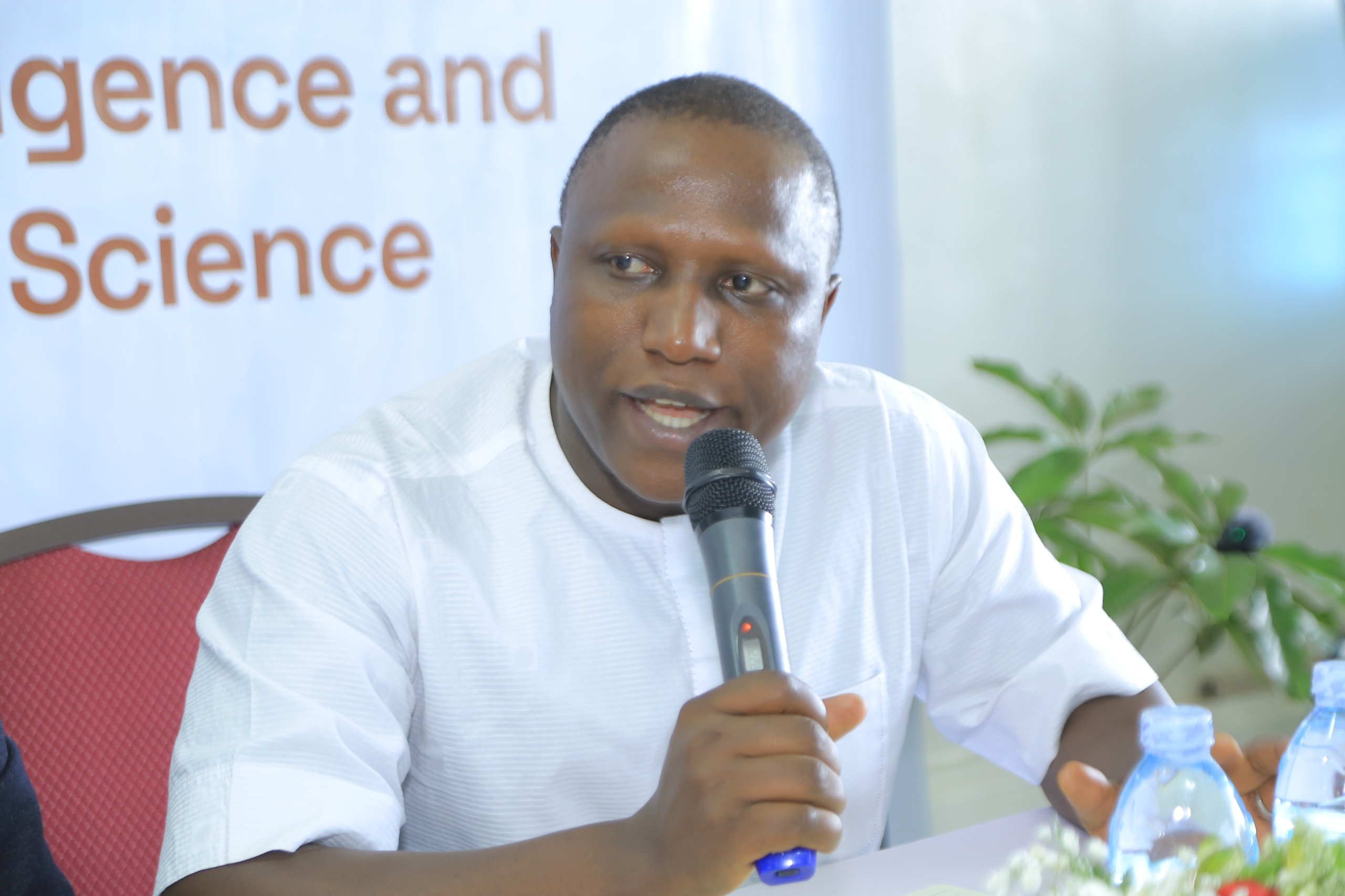
He emphasized that for AI to have meaningful impact, it must be integrated into real-life solutions that resonate with ordinary Ugandans. He illustrated this with an example from his hometown of Kanungu, where many people may not have formal education but still need to understand how AI can improve their lives. “They need to understand AI from the perspective of their real-life experiences. For us, using tools like ChatGPT is about accessing quick information, but how do we communicate AI to someone who has never been to a classroom but still needs to see its value?” he posed.
One of the critical areas where AI can make a transformative impact is healthcare. Nathan highlighted Uganda’s high maternal mortality rate due to a shortage of health workers and questioned how AI can be leveraged to bridge this gap. “We are losing so many mothers because we say we don’t have enough health workers to attend to them during childbirth. How do we use AI to amplify healthcare interventions, ensuring that AI tools support maternal care and other critical health services?” he asked.
He emphasized that AI’s significance lies in its ability to provide practical solutions to such challenges. “The responsible and responsive use of AI should directly address key areas like healthcare, transport, and agriculture,” he noted.
Uganda’s Lack of an AI Policy
Despite the growing importance of AI, Uganda currently lacks a national policy to regulate and guide its implementation. Nathan revealed that discussions with the Ministry of ICT and National Guidance are ongoing, with the Permanent Secretary of ICT tasked by Cabinet to spearhead the development of an AI policy. “Everyone is talking about AI, but what does it mean from a policy perspective? If you develop an AI-powered tool for healthcare, how does it fit within government systems if there is no policy framework to support it?” he questioned.

He acknowledged that while it is beneficial to learn from existing AI implementations before developing regulations, the rapid advancement of technology means Uganda cannot afford to delay its policy framework. “Technology is moving very fast, and we cannot wait. We need a policy, and conversations are ongoing. We hope that by the end of this year, we will have made significant progress,” he stated.
UNDP’s AI Capacity-Building Initiatives
To further support AI adoption in Uganda, UNDP is rolling out advanced AI training programs this year. The initiative will focus on building AI models and systems that can address local challenges. “We are not just looking at AI on a digital scale but focusing on practical AI applications. If we have data, how can we use it to develop AI models that solve real problems?” Nathan explained.
The training will include both residential and non-residential programs, equipping participants with hands-on skills in AI development. UNDP plans to collaborate with innovators to identify how AI can support their solutions. “It’s not just about teaching someone how to use ChatGPT. We want to see how AI can help an innovator solve a local problem in a meaningful way,” he added.
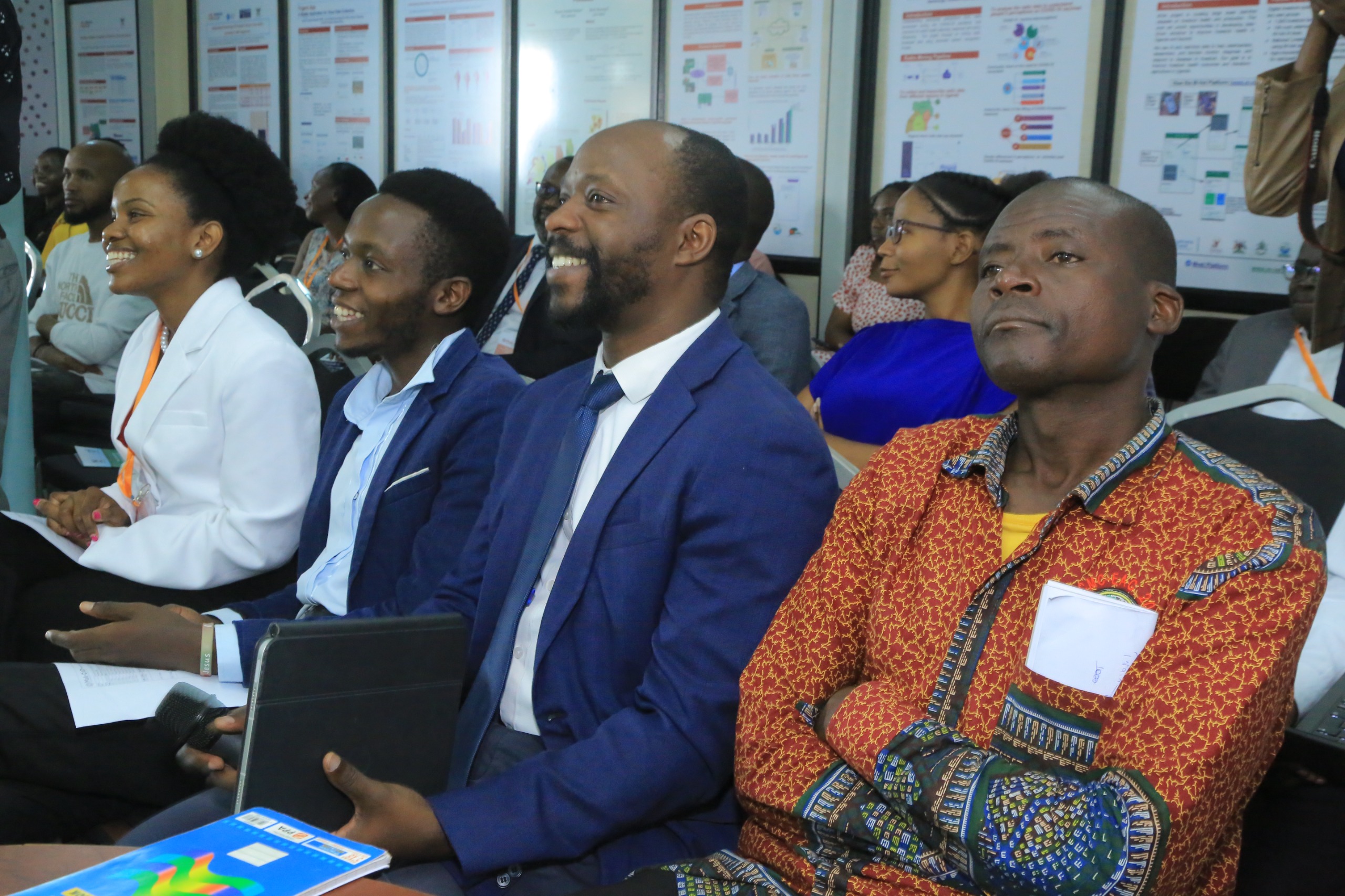
Nathan assured stakeholders that UNDP will continue working closely with the government to ensure responsible AI adoption. He stressed that ongoing consultations will help shape a policy framework that ensures AI benefits all Ugandans. “We will be moving around the country, consulting stakeholders together with the Ministry of ICT to ensure that AI is leveraged for the benefit of everyone,” he stated.
As AI continues to shape the future, UNDP remains committed to supporting Uganda’s AI ecosystem through policy advocacy, training, and collaboration with innovators to drive AI-powered development solutions.
You may like
-


Mak 76th Graduation Ceremony: CoNAS Presents 16 PhDs & Best Performing Male Student in the Sciences
-


Medical graduates urged to uphold Ethical values
-


CAES Presents Overall Best Performing Student in the Sciences & a Record 28 PhDs at the 76th Graduation Ceremony
-


Graduation marks the next phase of accountability, graduates told
-


Over 9,200 to graduate at Makerere University’s 76th Graduation
-
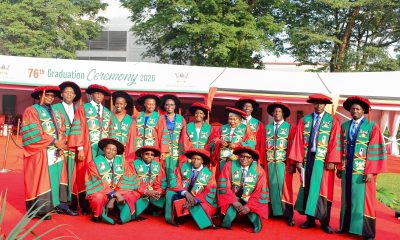

Mak 76th Graduation Ceremony: CEES Celebrates Academic Excellence, with 27 PhDs
Computing & IS
Makerere Launches Scholarly Guide, Calls for Increased Research, Publication and Innovation in Africa
Published
2 weeks agoon
February 12, 2026By
Jane Anyango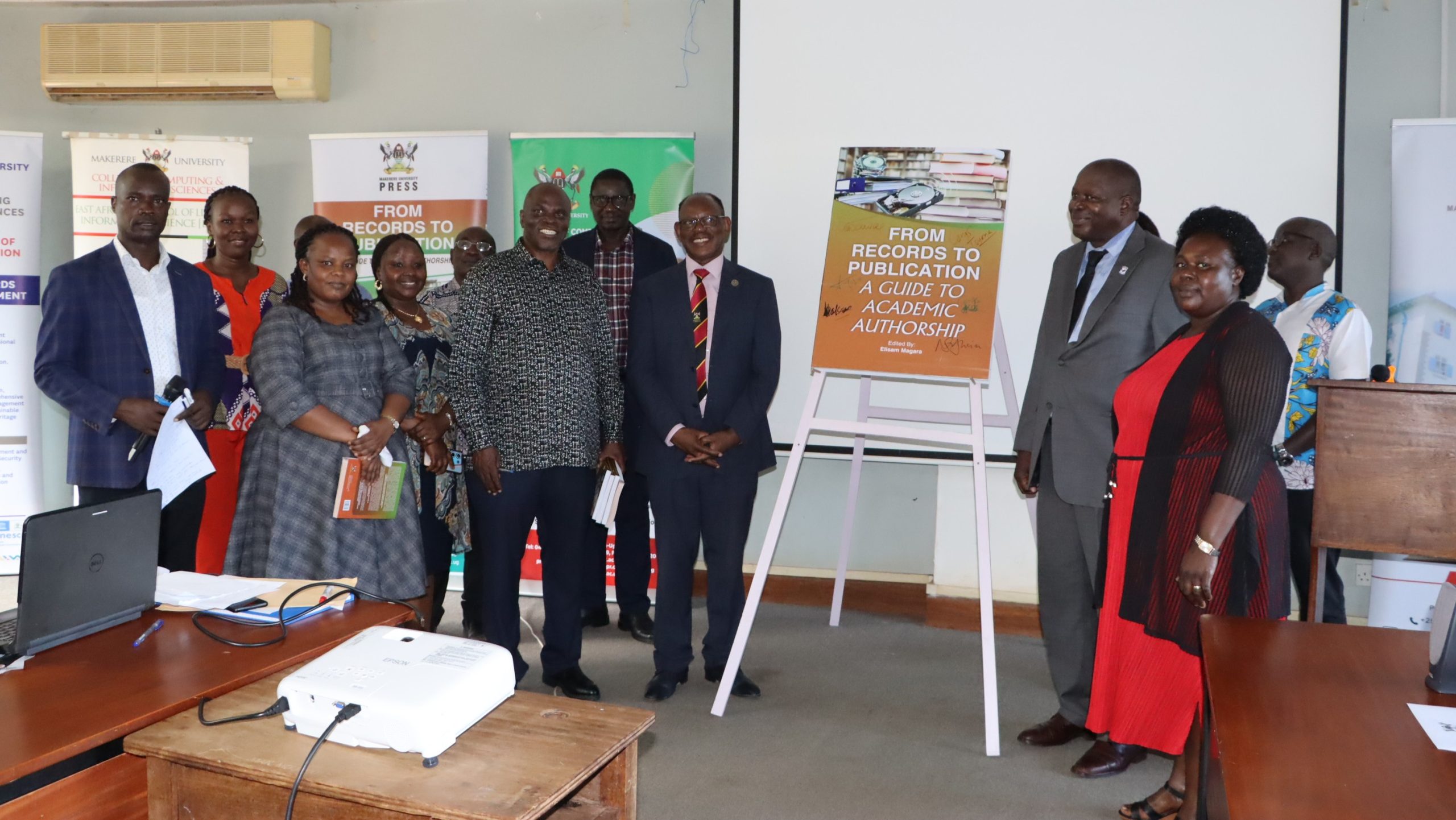
VC Emphasizes Research as Key to Africa’s Global Integration
Makerere University Vice Chancellor, Prof. Barnabas Nawangwe, has urged universities across Africa to invest in research, publication, and innovation as a pathway to greater participation in the global knowledge economy.
Speaking at the launch of From Records to Publication: A Guide to Academic Authorship, edited by Prof. Elisam Magara of the East African School of Library and Information Sciences, Prof. Nawangwe highlighted Africa’s low contribution to global scholarship. “Although Africa accounts for 15 percent of the world’s population, it produces only 3 percent of global research publications,” he said.
“There are historical reasons for this,” the Vice Chancellor continued, referencing centuries of slavery and colonialism. “You cannot brush away 600 years of subjugation. And we Africans have not even written enough about that. If we want to move Africa back into the global community, we must invest in research, publication, and innovation.”
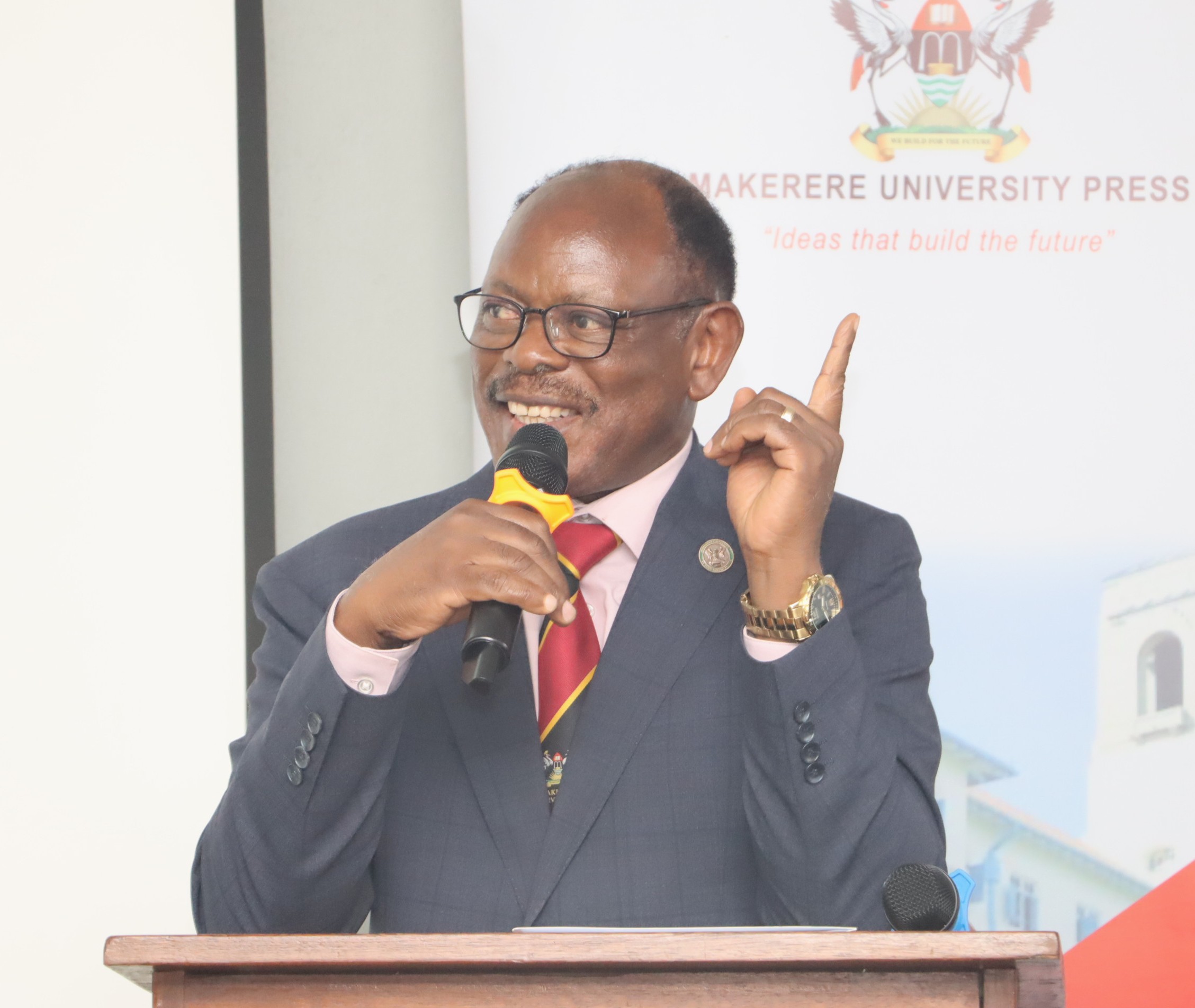
He cited China as an example, noting how the country’s investment in research and education has translated into economic and global influence. “When we say China is the factor of the world, it is not that people just wake up and begin making things. They invest in education, in publication, in research. If we want to transform Africa, we must do the same.”
Prof. Nawangwe highlighted Makerere’s progress, revealing that annual peer-reviewed publications have grown from about 500 a decade ago, to 700, and now exceed 2,000. He acknowledged that the university still trails South African institutions, partly because they operate numerous local journals that absorb significant volumes of research. “We are not fully utilising the brand of Makerere University Press,” he said, pledging support to strengthen the press and scale up journal production.
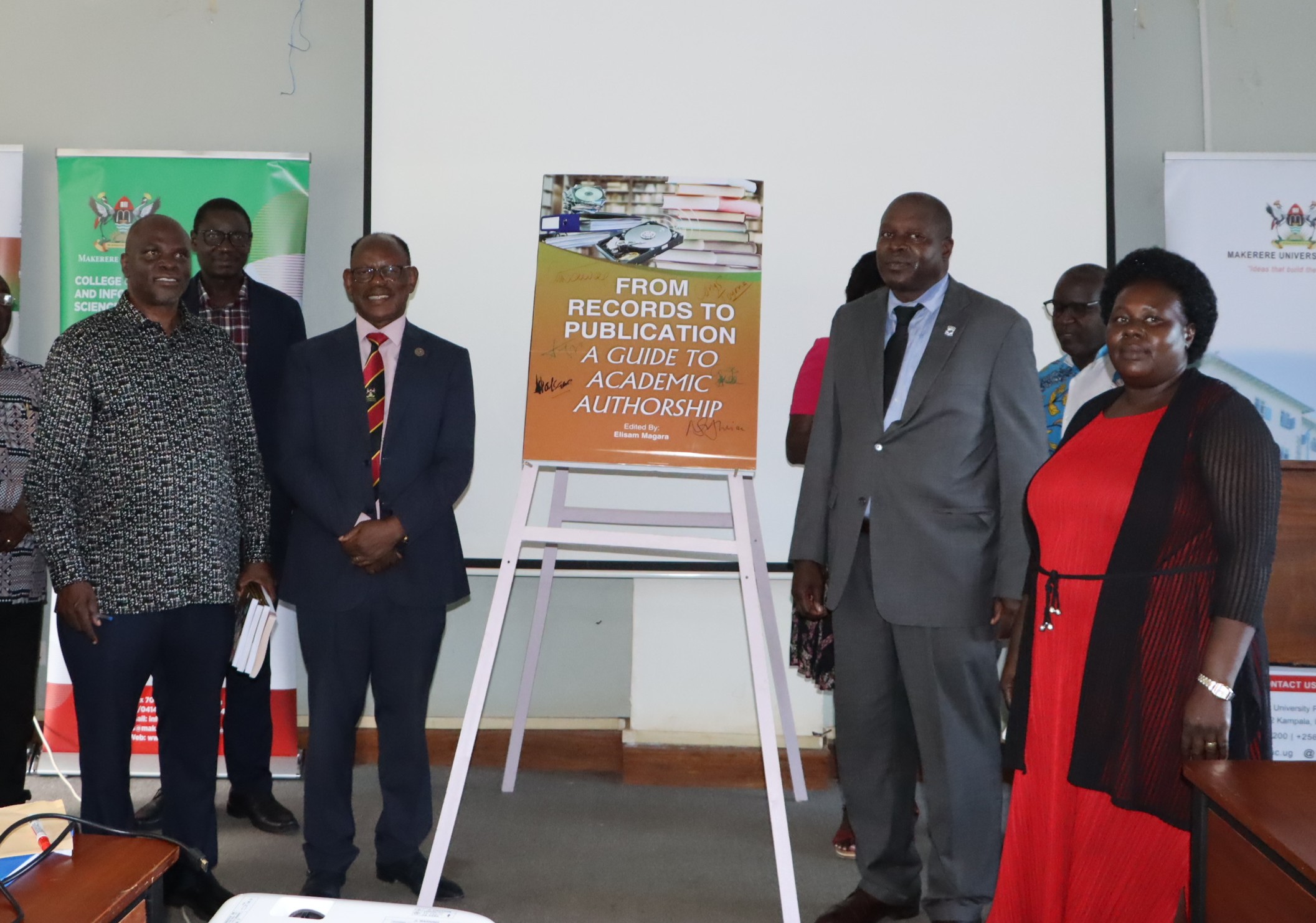
He also reaffirmed the university’s strategy to reduce excessive undergraduate enrolment and expand graduate training to boost research output. “Let us create time for professors to do research and supervise more graduate students,” he said.
Commending Professor Magara and his team for producing the authorship guide, Prof. Nawangwe described the book as an essential handbook for Master’s and PhD students, early-career researchers, and universities across the region striving to become research-led. “This is at the heart of the university. If we invest in research and publication, we secure our future,” he said.
Book Recommended as Mandatory Guide by College Principal
Makerere University’s Principal of the College of Computing and Information Sciences, Prof. Tonny Oyana, called for the newly launched volume to be adopted as a mandatory guide for graduate students and newly appointed lecturers. “This is not a bad book for our first-year PhD students to start with,” he said. “Even those who are hired as junior lecturers still need mentorship. If I were the Vice Chancellor, I would put this book as required reading for every new hire.”
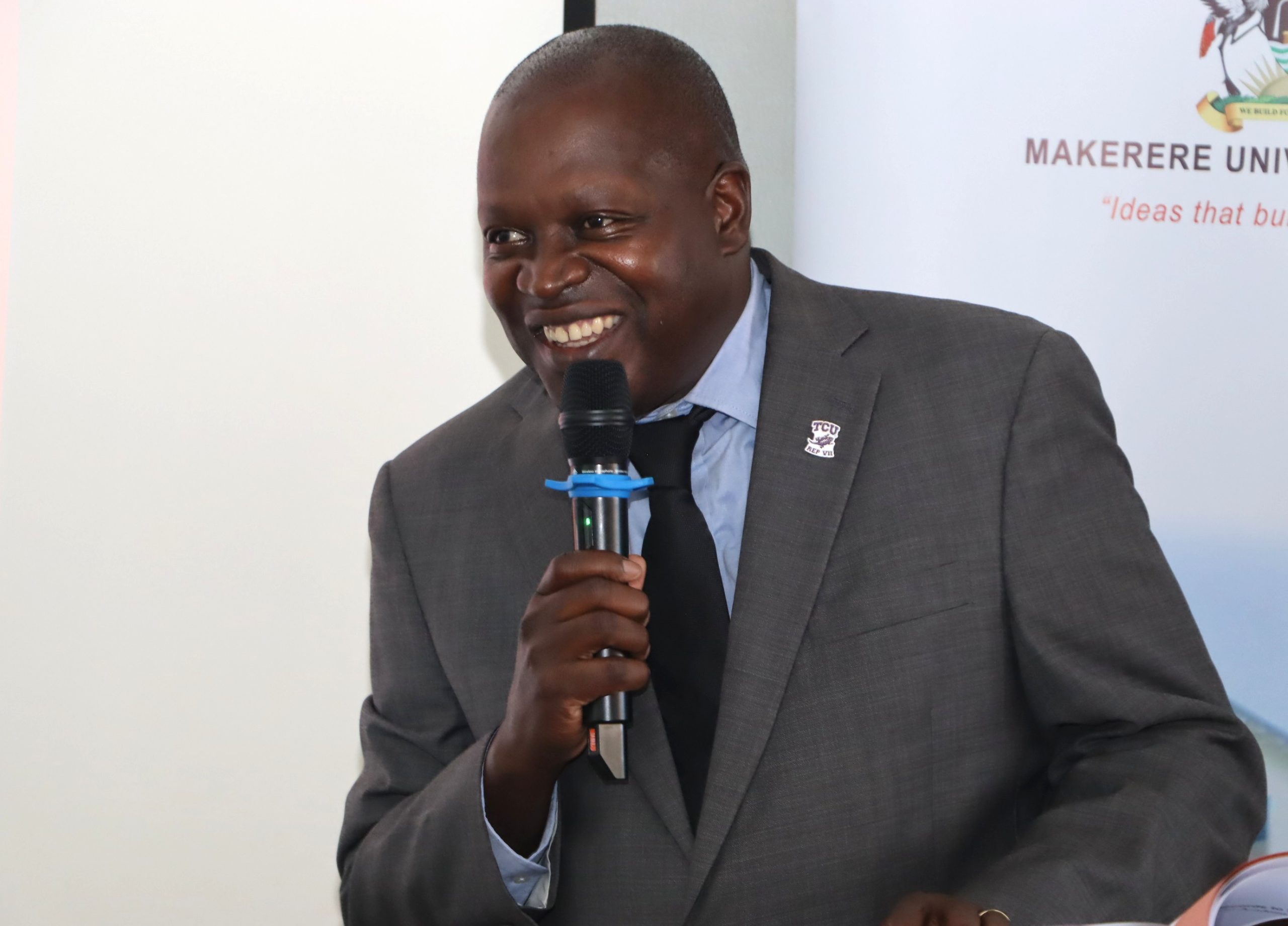
Prof. Oyana reflected on his personal contribution to the book, revealing that administrative responsibilities nearly forced him to withdraw. “Because of the work that I do, I was about to give up,” he admitted. “But Professor Magara was persistent. He came back to me and gave me more time.”
He credited a PhD student, Caroline Ilako, for assisting with library research and literature reviews, saying, “She did a wonderful job. We went back and forth through revisions, but finally we produced the work.”
On the quality of the book, Prof. Oyana said, “When you pick up a book, look at how it is laid out. The quick judgment tells you about the quality. This is well put together. We are beginning to show quality comparable to Western presses.”
He also challenged traditional notions of “publish or perish,” noting, “As scholarship evolves, those who evaluate scholarship must also adjust. Impact, innovation, and tangible products are increasingly valued alongside journal articles.”
Editor Highlights Research-Based Approach
Prof. Elisam Magara, the book’s editor, explained that the guide is designed to support scholars from the moment they conceive a research idea to the point their work is published and read. “I looked at the books we were using and asked myself: which kind of book can truly guide students? We needed a clear guide from the time a scholar thinks of writing up to the time the book is read,” he said.
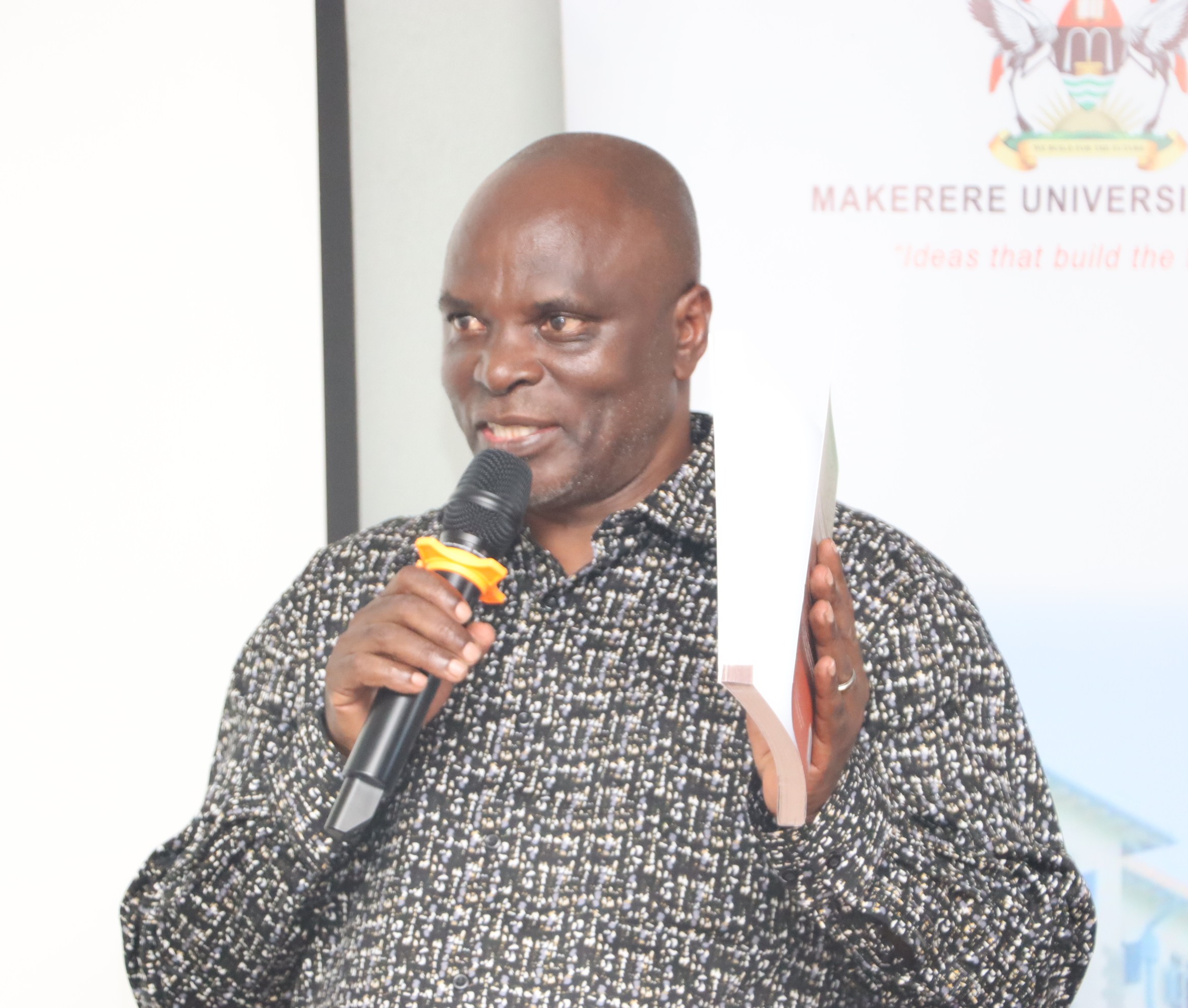
He detailed the rigorous editorial process that began in 2022, including international calls for contributions, peer review of abstracts, writeshops for feedback, and multiple rounds of chapter reviews. “Don’t write and keep,” he advised. “Your book must have impact. It must reach the public and be used.”
Prof. Magara also acknowledged the sabbatical granted by the Vice-Chancellor, which enabled him to balance teaching and editorial responsibilities. “This book is meant not just for Makerere but for scholars across the region and beyond,” he said.
Mak Press Outlines Rigorous Publishing Process
Dr. Isaac Tibasima, representing the Managing Director of Makerere University Press, explained the publication pathway. “Once you bring your manuscript to the press, we take it through evaluation, external peer review, revisions, copy-editing, typesetting, and pre-press review before printing,” he said.
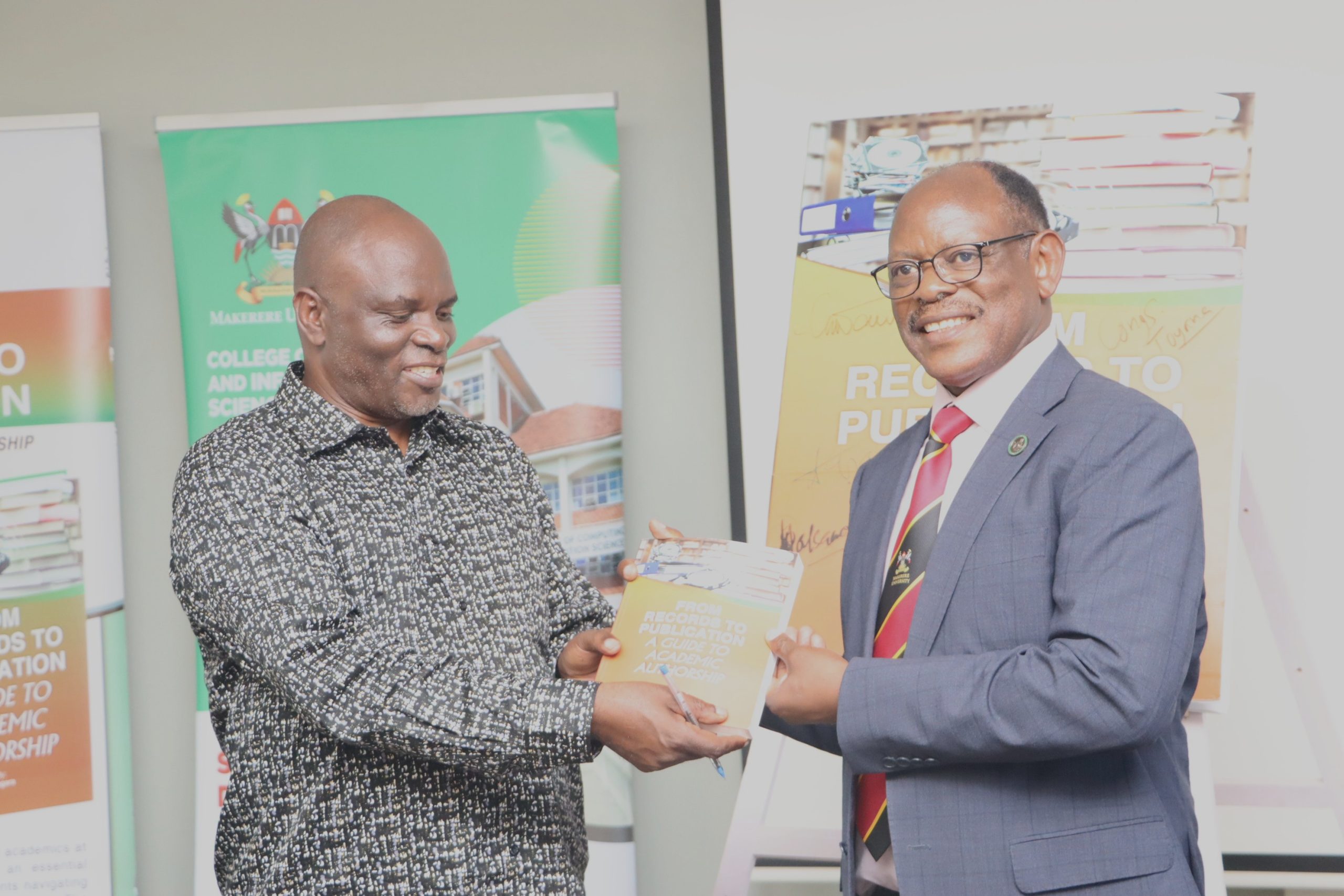
He also highlighted the press’s efforts to strengthen college-based journals. “We will not run the journals, but they will be published under the imprint of Makerere University. If we produce consistent issues, we can then move toward global indexing,” Dr. Tibasima said.
All new journals and articles now carry Digital Object Identifiers (DOIs) to enhance discoverability, while past publications are being retroactively assigned DOIs. “We are not there yet, but we are moving there, and we are intentional about getting there,” he added.
School Leaders Celebrate Scholarship and Mentorship
In welcome remarks, Dr. Sarah Kaddu, Dean of the School, said, “This event is a celebration of scholarship, intellectual discipline, and the journey of knowledge creation. This book speaks directly to one of the most critical challenges facing scholars—transforming research records into publishable work.”
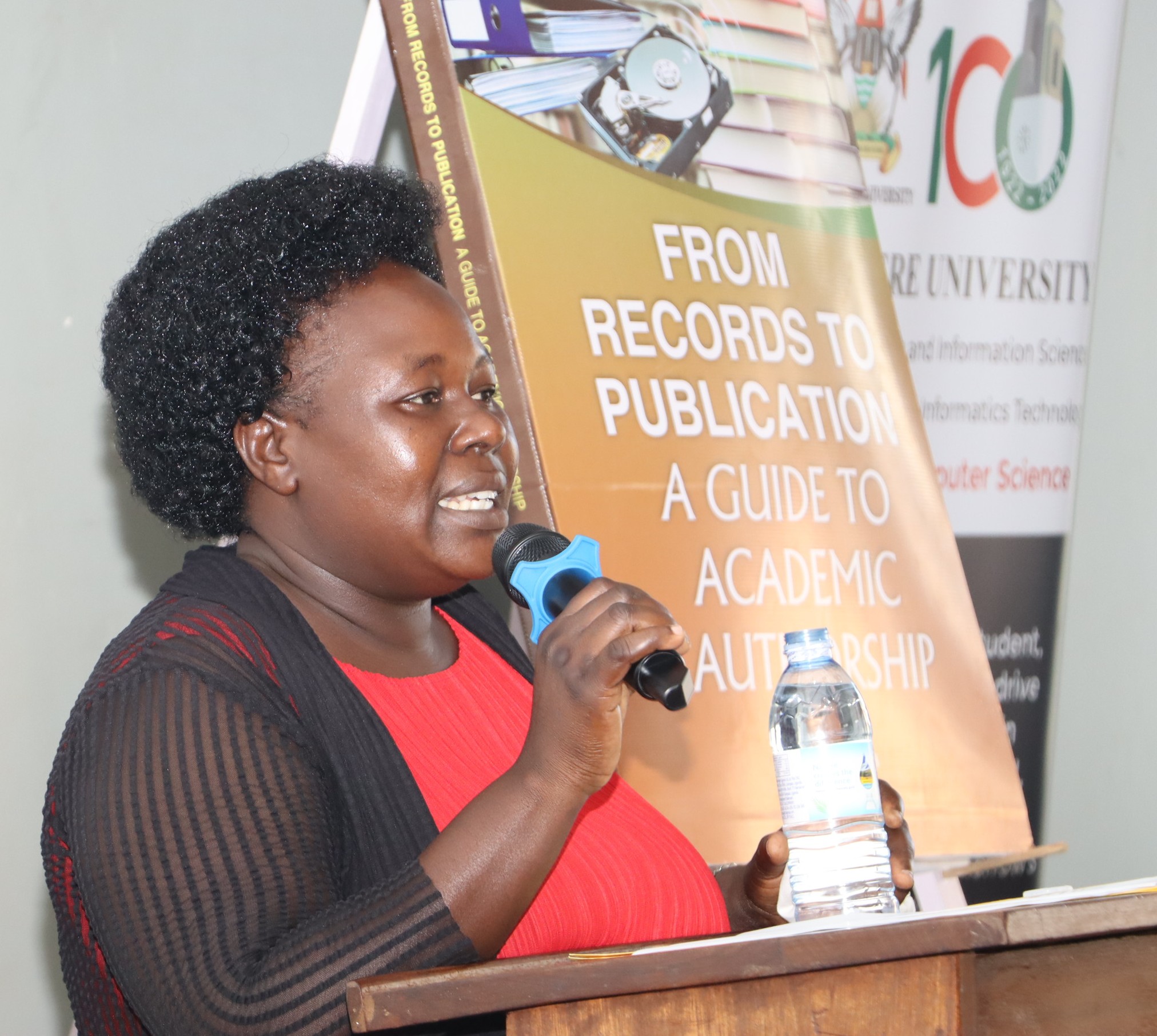
Dr. Sylvia Namujuzi, Head of the Department of Records and Archives Management, added, “This book is timely. It responds to real challenges faced by early-career researchers, postgraduate students, and even seasoned academics—questions of structure, authorship ethics, citation, collaboration, and navigating the publication ecosystem.”
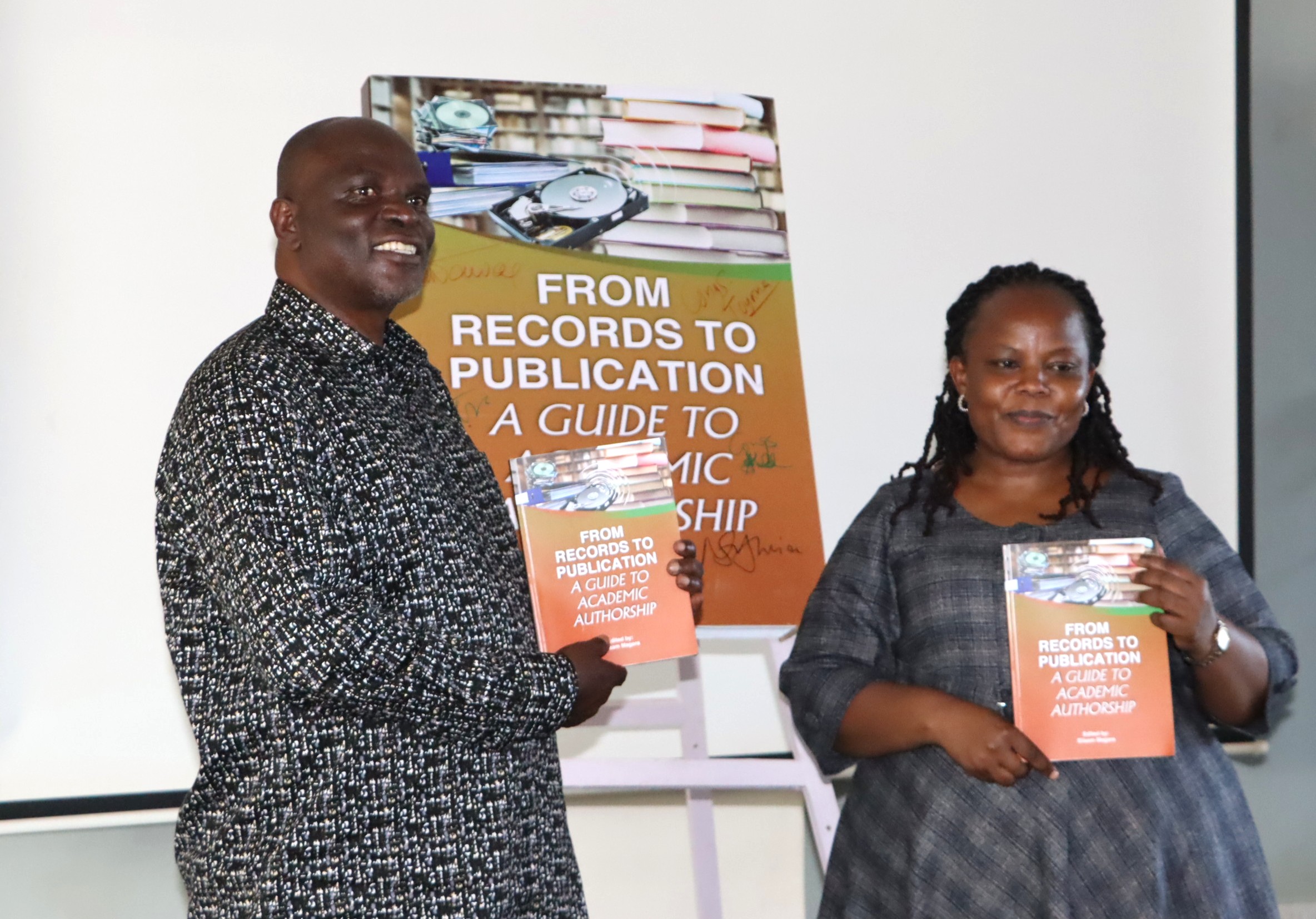
She concluded: “Well-managed records are not endpoints; they are the beginning of inquiry, reflection, and publication. This guide demonstrates that pathway.”
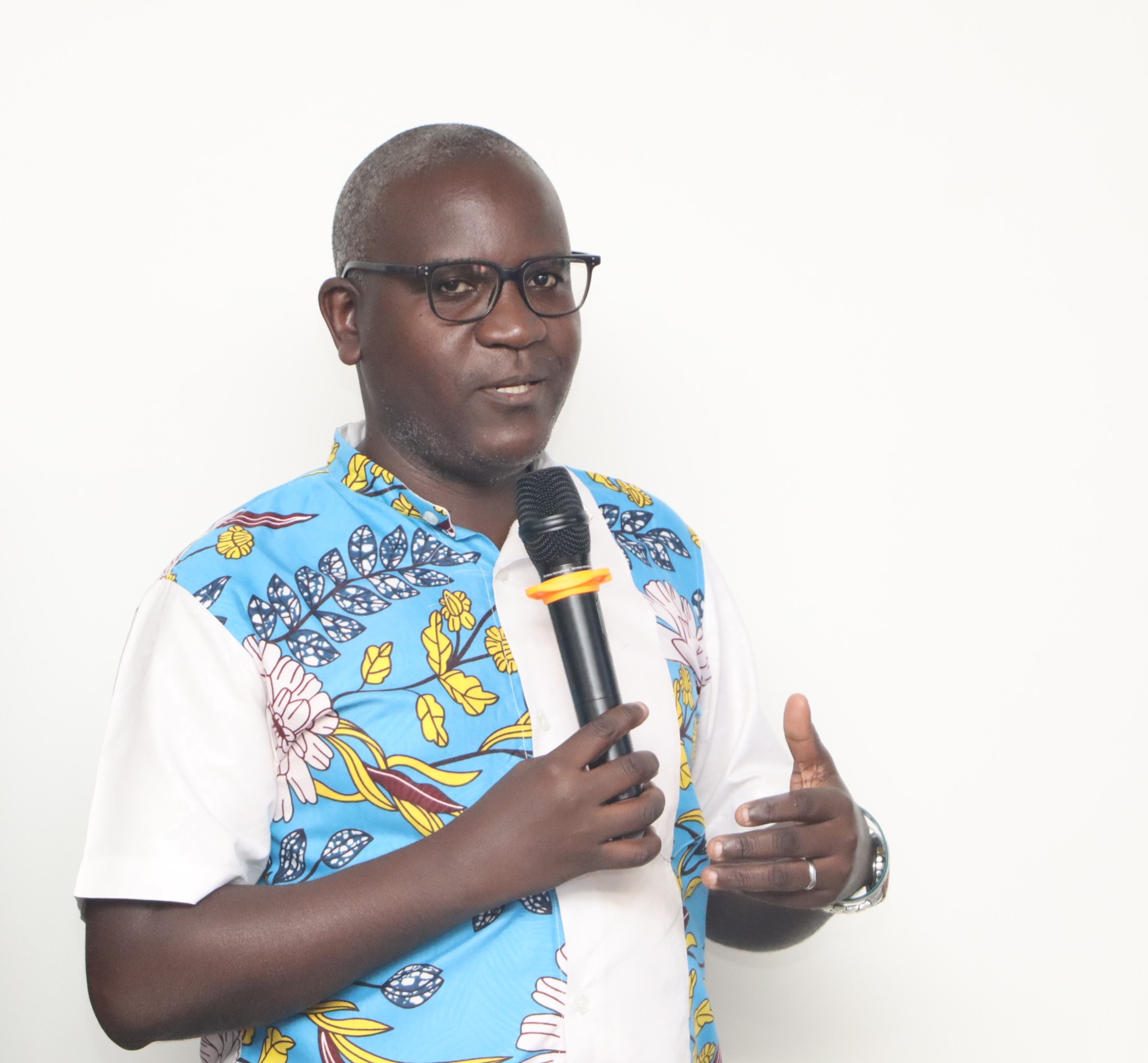
Book Outline
- Introduction: Publication Journey. (Prof. Elisam Magara)
PART I: Foundations of Academic Authorship.
- Conceptual Foundations of Academic Authorship
Elisam Magara and Joseph Kiplangat.
- Archives as a Source of Information for Academic Writing
David Luyombya, Sylivia Namujuzi and Francis Ekwaro
- The place of Oral History in Contemporary Writing
Elisam Magara, James Nkanshah-Obrempong and Nthan Nzyoka Joshua
- Managing Ethical Dilemmas in Academic Writing
Maria Tsvere, Tsitsi Kanonge and Joselin Chigwada
- The Role of Copyright and Neighbouring Rights in Protecting Works of Authors and Publishers in Uganda
Ronald Kakungulu Mayambala
PART II: Managing the Publication Process
- A Manuscript: From Inception to Publication
Sarah Mirembe Kyankya
- Managing Co-Authorship in Academic Writing
Gankhanani Moffat Moyo
- Managing Illustrations and Visual Artworks in Academic Writing
Bob Magara Rutatugirwa
- Tapping into Open Access Platforms for Gainful Authorship
George Muganga
- Managing the Costs in Academic Authorship
Aloysius Rukundo
- The Important Translation in Publication
Monica Mweseli
- Citations and Referencing in Academic Writing
Clement Lutaaya Nabutto, Namujuzi Sylivia, and Daviv Luyombya, Makerere University
- Referencing Management Software In Academic Writing
Odeke Moses Osamai and Constant Okello-Obura
- Compliance with International Bibliographic Control Standards in Academic Authorship
Elisam Magara and Dniel Osinde
PART III: Secondary Services in Academic Writing
- Journal Impact Factor and its Role when Submitting a Publication Article
Tonny J. Oyana and Caroline Ilako
- Managing Mentorship Programmes for Scholarly Writing
Diyoshak Rhoda Danladi and Elisam Magara
Report by
Jane Anyango, Principal Communication Officer CoCIS
Ritah Atukwatse, Journalism and Communication Student (2nd Year)
Fred Kanwagi, Journalism and Communication Student (3rd Year)
Computing & IS
CoCIS CIPSD Short Courses Jan-Mar 2026
Published
1 month agoon
January 19, 2026By
Mak Editor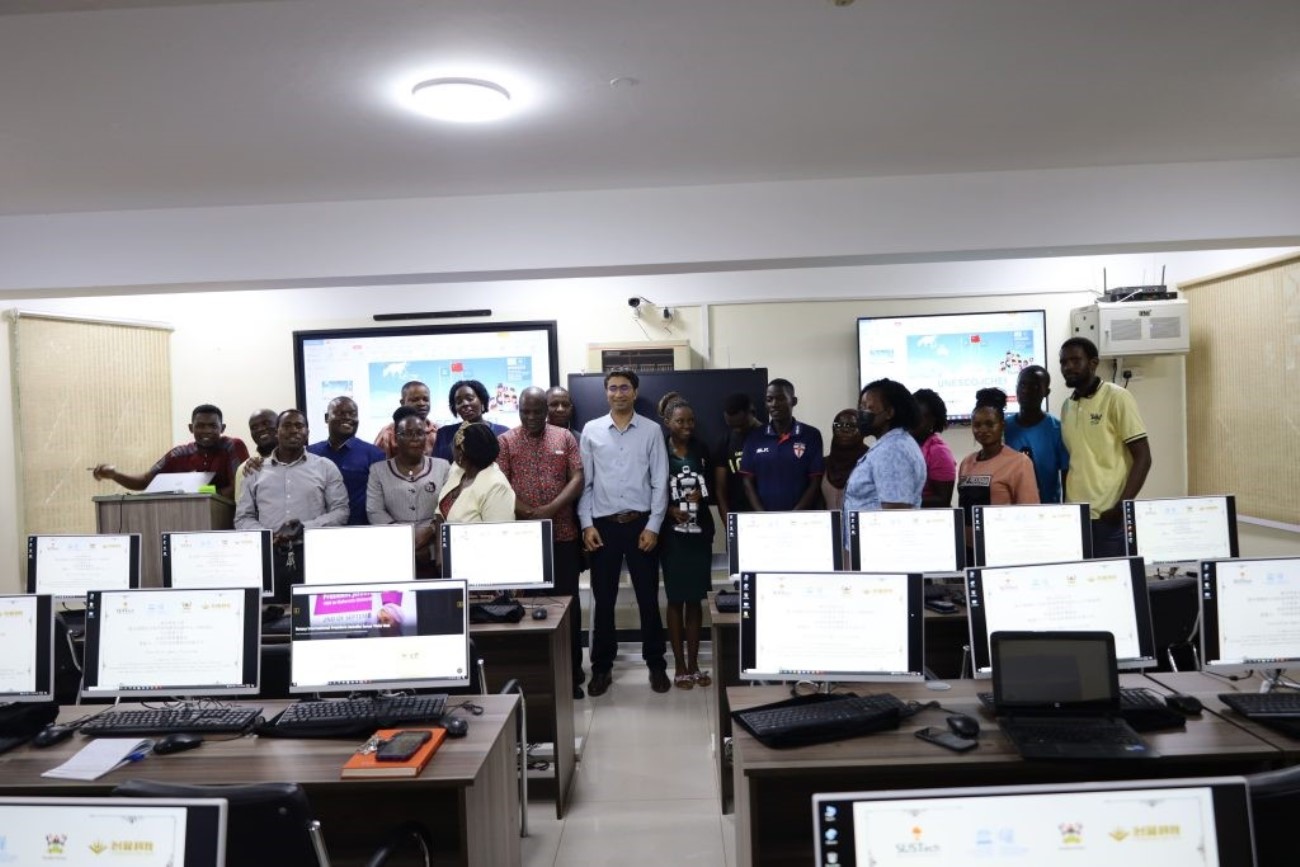
Makerere University College of Computing and Information Sciences (CoCIS) is the main ICT Training, Research and Consultancy Centre in Makerere University. The College has six Academic departments comprising of the Department of Computer Science, Department of Networks, Department of Information Technology, Department of Information Systems, Department of Library and Information Sciences, and the Department of Records and Archives management.
In addition to the mainstream degree programmes, CoCIS has a specialized Center for Innovations and Professional Skills Development (CIPSD) which delivers state-of-art training in ICT e.g. the Cisco Networking Academy for Cisco related courses, the Microsoft IT Academy Program for Microsoft related courses, International Computer Driving License course, Oracle Certified Training center for Oracle, Linux and Unix Training center. CIPSD also offers Machine Learning, Big Data Analytics, Data Science, Artificial Intelligence (AI) and Ethical Hacking as online courses. The College is an authorized Testing center, operating under PearsonVUE and Kryterion. Listed in the table (see download below) are the courses currently offered at the Center with their next start dates, duration, and cost.
- All courses are at affordable fees catering for Students, Vacists, Professionals and
- Anyone who wants to start a career in ICT or polish his/her ICT skills.
Contact Information
E-mail: psd.cis@mak.ac.ug
Tel: +256 782 512 897 +256 752 779964
URL: https://cocis.mak.ac.ug/cipsd/
Computing & IS
Makerere University and SoonPay Sign Landmark MoU to Champion Blockchain Innovation and Financial Inclusion Across Africa
Published
3 months agoon
December 9, 2025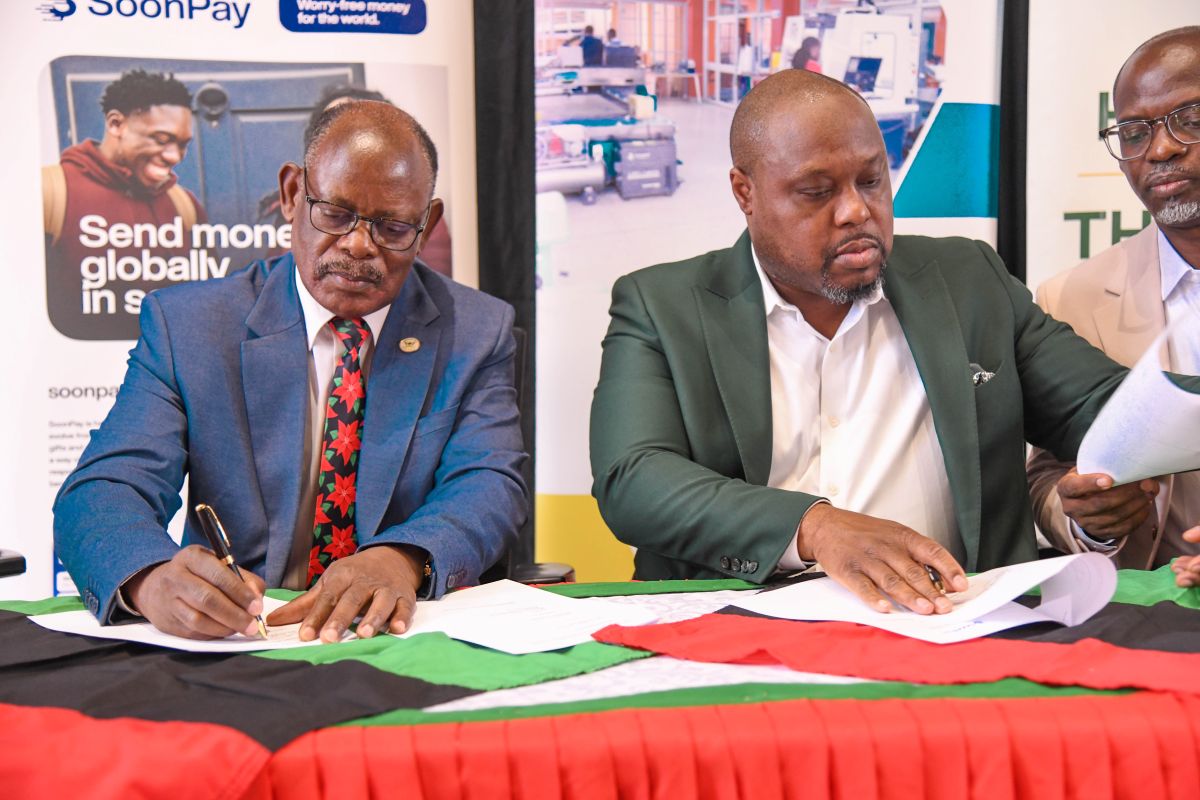
On Saturday 6th December 2025, Makerere University entered into a ground-breaking partnership with the U.S.-based fintech company SoonPay, marking a major breakthrough in Uganda’s push to integrate emerging technologies into research, innovations, higher education and national development.
The Memorandum of Understanding was signed by the Vice Chancellor of Makerere University, Prof. Barnabas Nawangwe and Mr. Frantz Morency, Chief Executive Officer of SoonPay L.L.C, during the Makerere University Financial Innovation Day, a high-energy event that brought together over 800 students, faculty, industry partners, and technology leaders.
The MoU institutionalizes the collaboration of Makerere University through the Makerere University Technology and Innovation Centre and SoonPay LLC. The signing ceremony was witnessed by Dr. Cathy Ikiror Mbidde-Manager of Makerere University Technology and Innovation Centre and Ms. Vuyani Jones-Blockchain Infrastructure Manager.
Organized by the Makerere University Technology and Innovation Centre (MUTIC) in partnership with SoonPay, the event ran under the theme “Innovation and Financial Inclusion for a Secure Future.” It featured keynote speeches, panel discussions, live demonstrations, and the signing of a Memorandum of Understanding (MoU) that will usher in a new era of blockchain training, research, and innovation at Uganda’s premier university.
The event was supported by several partners, including the National Social Security Fund (NSSF), the Uganda Blockchain Association, the National Planning Authority (NPA), Prudential Uganda, and other technology and financial sector stakeholders.
A Strategic Partnership to Transform Africa’s Digital Landscape
The newly signed MoU between Makerere University and SoonPay is expected to unlock a broad set of opportunities for students and academic staff. These include blockchain education and certification, joint research projects, internships and apprenticeships, the development of new financial inclusion tools, and the integration of emerging technologies into existing academic programs.
SoonPay’s entry into Uganda is part of a larger vision to expand blockchain-driven solutions across Africa—a continent its executives say has historically been excluded from global technological revolutions.

Impressed by the overwhelming numbers of students who filled the Yusuf Lule Central Teaching Facility Auditorium to the brim, the Vice Chancellor, said: “Dear students, by choosing to stay on campus, on a Saturday, and after completing your examinations, you have demonstrated your willingness to learn and embrace the blockchain technology as well as emerging technologies in general.”
Stating that blockchain technology is the future for Africa, the Vice Chancellor challenged the students to take charge of Africa’s digital transformation.
“You are the people to emancipate Africa from marginalization,” he declared. “What will liberate our continent is not politics—we have done too much of that. It is education, research, innovation, and technology.”
Prof. Nawangwe delivered a sweeping historical reflection, tracing Africa’s technological setbacks to the destruction of its civilization over several centuries.
“For 400 years, Africans were taken away as slaves. For another 200 years before that, our lands, knowledge systems, and technologies were disrupted,” he said. “This represents around 600 years of destruction and marginalization of African civilization.”
He urged students not to miss the opportunity that modern technologies such as blockchain and artificial intelligence present.
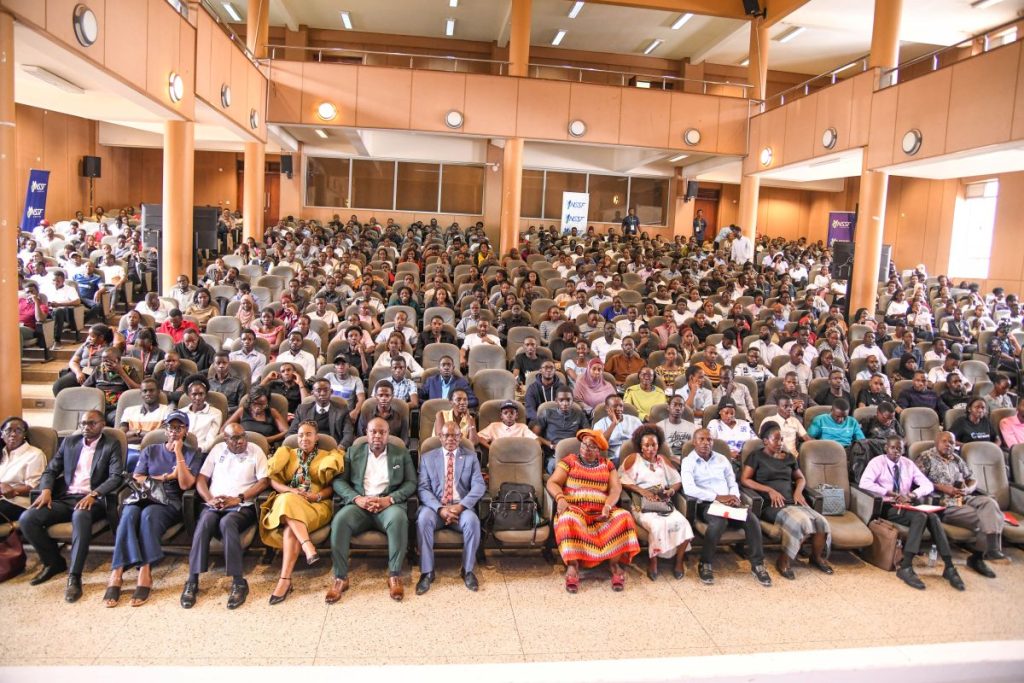
“We are lucky to be living in an era where Africa is free,” the Vice Chancellor said. “My hope is that we do not wait another 600 years to take advantage of this freedom. The most important resource we have is not minerals; it is human resources—you, the youth.”
Prof. Nawangwe reminded students that Makerere’s reputation as the “intellectual capital of Africa” places immense responsibility on their shoulders.
“You are among the very few Ugandans privileged to study at Makerere University. University graduates are not supposed to wait for jobs—you are the ones expected to create them,” he said.
Why Blockchain? Transparency, efficiency, and global competitiveness
The Vice Chancellor highlighted the transformative potential of blockchain technology, especially in improving financial systems—a sector he described as the backbone of any modern economy.
“Without efficient financial systems, nothing else works,” he said. “Blockchain offers transparency, reduces fraud, and minimizes corruption. If applied properly, it could transform how we manage finances, education, and even our natural resources, including the oil that Uganda is about to exploit.”
He added that Makerere’s students are already demonstrating global competitiveness in innovation, winning international competitions and creating products across multiple disciplines.
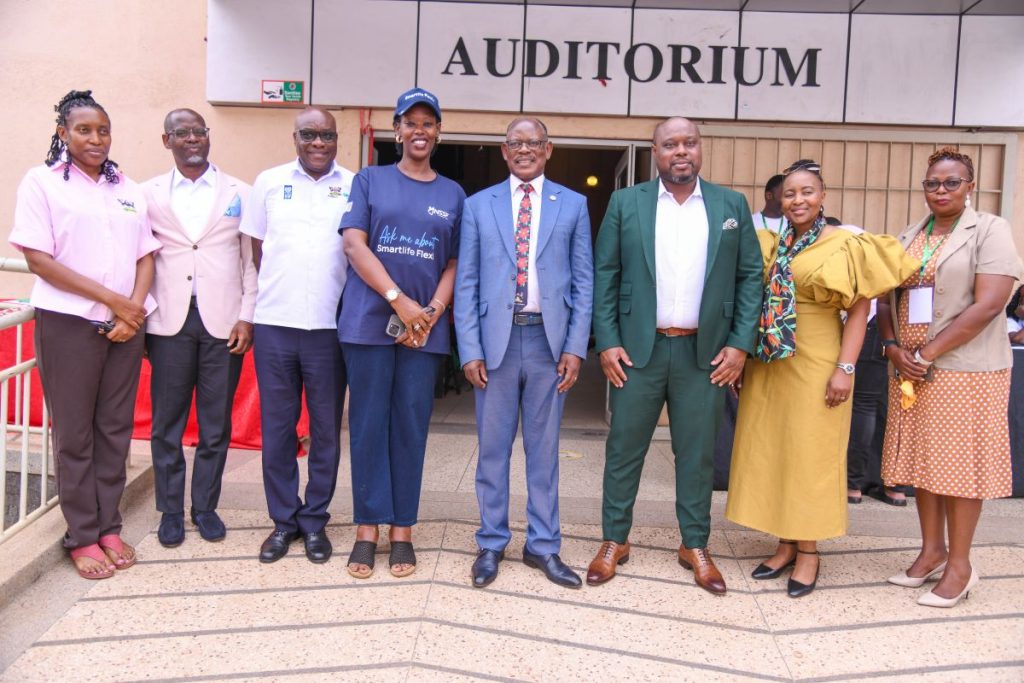
“The brains are here,” he said. “What we need is exposure to opportunities and technologies that will help you turn your ideas into impactful solutions.”
In a passionate keynote address, SoonPay CEO, Mr. Frantz Morency underscored why his company chose Uganda as its launchpad for blockchain adoption in Africa.
“As the Professor said, we have been excluded for more than 400 years,” he stated. “Even though we’re an American company, we know our roots. Look around the SoonPay team—you will see yourselves. We chose Uganda intentionally.”
Mr. Morency pointed to Africa’s dismal participation in the global blockchain economy. “In the U.S., blockchain generates $2.6 billion—61.7 percent of the world’s share. The rest of the world generates $1.6 billion. And Africa, just $14 million, or 0.33 percent,” he said. “That is unacceptable.”
He attributed the gap not to a lack of interest among young Africans, but to a lack of opportunity. “You want to learn—what you lacked was opportunity,” he said. “With the support of Professor Nawangwe, Dr. Cathy Ikiror Mbidde, and Dr. Margaret Nagwovuma, SoonPay wants to bridge that gap in education, technology, and economic opportunity.”
Mr. Morency also shared his personal journey, connecting his Haitian background to the aspirations of African youth.
“Many of you may see me as ‘the guy in the green suit,’ but I come from a small island—Haiti,” he said. “My mother never finished first grade; my father never finished second grade. What they gave me was integrity, work ethic, and the determination to seize opportunities when they came.”
He urged students not to seek opportunities abroad out of desperation, but to build meaningful careers in Africa. “Africa does not need to lose its talent. Why can’t you build here? Why can’t businesses, innovation, and prosperity thrive here?” he said. “Educate yourselves. Build. Create. Grow.”
A milestone for Makerere and Africa
Dr. Cathy Ikiror Mbidde, Head of the Makerere University Technology and Innovation Centre (MUTIC), described the event as a “major milestone” in the institution’s evolution.
“We are here to witness one of the key emerging technologies and to reflect on how universities can embrace such milestones,” she said. “Everyone has a role to play in transforming our lives through research, ideas, and projects.”
She thanked SoonPay for choosing Makerere University, noting that students had been “instrumental” in pushing for blockchain education.
“You have been constantly asking questions, pushing us, and showing deep curiosity about blockchain. Today, we finally have answers,” she told the students.
Beyond the speeches, the event showcased SoonPay’s blockchain infrastructure, student-led innovations, and a roadmap for integrating digital finance tools into university programs. Partners such as NSSF emphasized the importance of preparing young people for a digital future.
With the MoU now in force, Makerere University is positioning itself as a regional hub for blockchain education, research, and innovation. The partnership with SoonPay aims not only to train students but to shape Uganda’s—and Africa’s—next generation of tech leaders.
Trending
-

 Humanities & Social Sciences4 days ago
Humanities & Social Sciences4 days agoMeet Najjuka Whitney, The Girl Who Missed Law and Found Her Voice
-

 Health1 week ago
Health1 week agoUganda has until 2030 to end Open Defecation as Ntaro’s PhD Examines Kabale’s Progress
-

 Agriculture & Environment7 days ago
Agriculture & Environment7 days agoUganda Martyrs Namugongo Students Turn Organic Waste into Soap in an Innovative School Project on Sustainable Waste Management
-

 General1 week ago
General1 week agoMastercard Foundation Scholars embrace and honour their rich cultural diversity
-

 General3 days ago
General3 days ago76th Graduation Highlights
